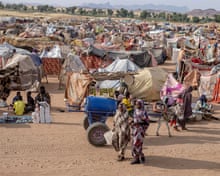Brown University Students Hide After Shooter Attacks Campus

© Jen Mcdermott/Associated Press

© Jen Mcdermott/Associated Press

 Sky UK
Sky UK'Tis the season to slob out on the sofa and demolish a packet of mince pies in front of a good movie, or a bad movie - or a movie that's so bad it's good.
This year, as ever, a crop of new Christmas films are hoping to be part of our festive viewing - and perhaps even join the ranks of enduring classics alongside the likes of Home Alone, Elf, Love Actually and Die Hard (don't start).
So, in an effort to bring you a vital public service by sorting the crackers from the turkeys, and in an attempt to get myself into the Christmas spirit, I binged as many new Christmas films as possible in a day.

 Disney/John Medland
Disney/John MedlandStarting, hopefully, on a high. This is the only 2025 release on Rotten Tomatoes' list of the greatest 100 Christmas movies of all time. (No, honestly, it is, you can check.)
The Jonas Brothers find themselves stuck in the UK after wrapping up their world tour and must get home for Christmas. Their attempts are hampered by an evil Santa, who breaks into song to say they won't get home until they "rediscover their brotherly magic".
The banter between the bickering brothers is entertaining even for the uninitiated, while fans will no doubt pick up on lots of in-jokes as they attempt to get back to their families using any means of transport necessary.
It's private planes, trains and automobiles.
It's not an all-time classic after all, but is great for fans and a good start to the day.
Christmas tree rating:🎄🎄🎄🎄🎄for Jonas Brothers fans or🎄🎄🎄for Jonas Brothers fans' family members who will have to sit through it
On Disney+

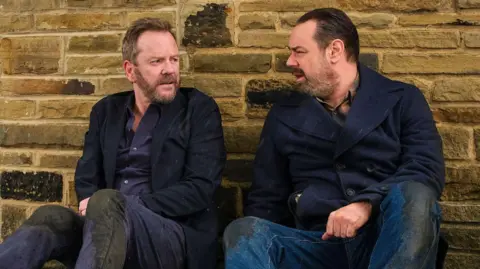 Sky UK
Sky UKHollywood star Kiefer Sutherland has been cast as a Hollywood star cast in a pantomime.
"A panto-what?" asks Sutherland's "difficult" and ageing action hero Brad Mack, who has fallen on hard times and whose agent has tricked him into thinking he's starring in prestigious English theatre.
His Aladdin cast-mates inform him he's playing Buttons. "Oh no I'm not," he insists angrily. You can guess their reply. Unless you're unfamiliar with traditional panto catchphrases.
There are some very funny lines, some cockle-warming sub-plots, and the rest of the cast is cracking, too.
Rebel Wilson plays the panto's choreographer (with a Yorkshire accent), Derek Jacobi plays the theatre stage door manager, Meera Syal plays the director, Jason Manford and Asim Chaudhry play the ugly sisters, Lucien Laviscount plays the prince, Katherine Ryan plays Brad's agent, and Danny Dyer plays Danny Dyer.
It's the type of film that would be a bit naff at any other time of year, but is a lot of fun at Christmas.
Christmas tree rating:🎄🎄🎄🎄
On Sky Cinema/Now

 True Brit Entertainment
True Brit EntertainmentDanny Dyer pops up at the start of this film, too, calling someone a mug for the second film in a row. Is this a new Christmas tradition?
This time, he's a singing black cab driver who picks up Mr Sood, the latest spin on Mr Scrooge from Charles Dickens' A Christmas Carol.
Mr Sood is played by The Big Bang Theory's Kunal Nayyar and Christmas Karma is directed by Bend It Like Beckham's Gurinder Chadha. The familiar story unfolds as the miserly Mr Sood is visited by the ghosts of Christmas past, present and future, played by Hugh Bonneville, Billy Porter and Boy George.
This Indian Scrooge is at least different from all the others, but unfortunately he's not very charismatic and Nayyar's performance is flat - a problem when he's so central to everything.
Christmas tree rating:🎄🎄
In cinemas now, and buy and rent on digital platforms from Monday 15 December


There's time before lunch for the BBC's original festive film (well, a 60-minute comedy-drama special) - which stars Guz Khan as a lovably grouchy guy who "doesn't really do Christmas".
But after he gets an £8,000 Christmas bonus at work, his wife (Morgana Robinson) persuades him to blow the money on a family trip to Lapland.
There's just one problem - he discovers there was an error with his bonus, which should have been £800, and he has to figure out how to pay back the difference.
Enjoyable but forgettable.
Christmas tree rating:🎄🎄
On BBC One and iPlayer on Tuesday 23 December

 Mika Cotellon/Netflix
Mika Cotellon/NetflixThis is one of those Christmas films where the tree, fairy lights and snow are in the background - Christmas is the setting of the film rather than its raison d'etre - but it feels cosy and festive all the same.
Ambitious executive Sydney (Minka Kelly) is sent to a French chateau to do a deal to buy a champagne business. En route, she meets a guy in a book store who promises to show her Christmas in Paris.
Journalist and author Olly Richards recently told the Bah Humbug Christmas film podcast this is the best new Christmas film of the past few years. That's a bit of a stretch, but it is a Christmas romance with a touch of class and gives the required warm and fuzzy feels.
The scene with a lengthy discussion about Die Hard is very good too.
I'm starting to feel a bit festive, and pop out to buy some mince pies to keep me going for the rest of the day.
Christmas tree rating:🎄🎄🎄
On Netflix

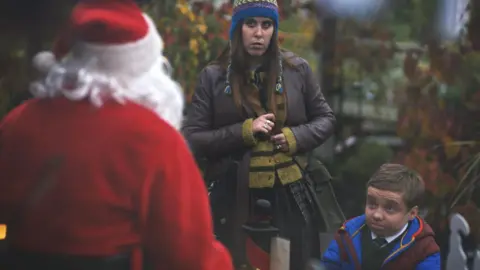 Channel 4
Channel 4Sixteen-year-old Chris, played by Lenny Rush, refuses to stop believing in Father Christmas, despite the attempts of his dad (The Inbetweeners' James Buckley) to tell him otherwise.
The truth is out there, and Chris sets out to find it with the expert help of Sir Stephen Fry, Hannah Fry, Dame Dr Maggie Aderin-Pocock and Jason Fox.
It's low-key but charming, and good viewing while waiting for Santa to visit.
Christmas tree rating:🎄🎄🎄
On Channel 4 on Christmas Eve

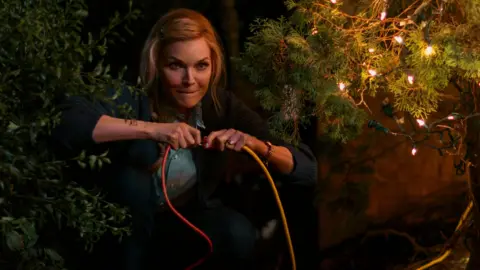 Prime Video
Prime VideoMichelle Pfeiffer is the matriarch of a quarrelling American family who come back together for the holidays - including fellow Oscar nominee Felicity Jones, Chloe Grace Moretz, Jason Schwartzman and dad Denis Leary.
Pfeiffer begins by referencing classic festive films like National Lampoon's Christmas Vacation, It's A Wonderful Life and Home Alone, before saying: "They need to make a movie about the true heroes of the holidays - moms."
So that's what this is, but in reality it's really a jumble of those forerunner films, at least until Pfeiffer's character finally comes into her own.
Christmas tree rating:🎄🎄
On Amazon Prime Video

 Channel 5
Channel 5The day's gone downhill, but thankfully here's a new entry in the crowded field of formulaic, schmaltzy, badly acted - and highly entertaining - festive fodder.
It's a tale as old as time, or as old as the Hallmark Channel at least. An American woman goes on a quest to a distant snowy land and ends up stumbling across romance.
In this case, Caprice Bourret plays a publisher who travels from LA to the Scottish Highlands (with sister Patsy Kensit back at home) and tracks down an author who must clear his writer's block, solve a family mystery, and save the local castle from Duke Hamish.
Cheap and cheesy is by no means a bad thing for a Christmas film and it's given me a more unashamedly festive feeling than most of the others.
Christmas tree rating:🎄 but🎄🎄🎄🎄🎄 if you know and like what you're getting.
On Channel 5, streaming service 5 and Paramount+

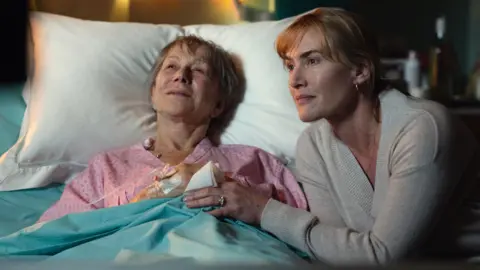 Kimberley French/Netflix
Kimberley French/NetflixI've saved the most intriguing for last. This is Kate Winslet's directorial debut, and she stars alongside Dame Helen Mirren, Toni Collette, Timothy Spall, Andrea Riseborough and Johnny Flynn.
It's not your typical feelgood festive fun. Dame Helen's character has cancer and may or may not make it to Christmas. It's an intimate family drama with top-drawer performances.
I was ready to be cynical about the fact it was written by Winslet's son Joe Anders when he was 19, a nepotastic endeavour, but the script is skilled and sensitive, if sentimental.
You wouldn't put it on for an easy Christmas comfort watch, but it does have levity and warmth as well as tear-jerking realism, so stands out from the festive films that are as gaudy and hollow as a bauble.
Christmas tree rating:🎄🎄🎄🎄
In cinemas now and on Netflix from Christmas Eve
There are lots more new Christmas films, but that's probably more than is healthy for one person to watch in one day.
Despite the huge variety, they're all about journeys of self-discovery and the appreciation of what's important in life. Are there any future classics? Probably not.
I'm finally feeling festive enough to put up the Christmas tree, though, and will decorate it with Die Hard on in the background.

 Getty Images
Getty ImagesDisaster, catastrophe and nightmare. That's how Hollywood's creative workers describe the fall of the once mighty Warner Bros, as Netflix and Paramount battle to buy the historic studio and tinsel town braces for more upheaval and job losses.
Warner's decline and impending sale – whether it's to Paramount Skydance as a whole, or to Netflix cut up in parts – is being mourned in Hollywood, where a historic production slump has already battered the entertainment industry. The loss of the studio, which has created iconic films ranging from Casablanca and Goodfellas to Batman and Harry Potter, likely means more job cuts and definitely means one less buyer of film and TV projects.
Interviews with dozens of actors, producers and camera crews by the BBC reveal an industry attempting to weigh the lesser of two evils: control by a tech giant blamed for killing movie theatres (Netflix) or billionaires seen as too cosy with President Trump (Paramount).
"David Ellison is a right-wing billionaire Trumper," a camera assistant said of the Paramount Skydance CEO who is the son of billionaire Oracle co-founder and close Trump ally Larry Ellison. "Netflix is much more historically inclined to not micromanage production."
If Netflix gets the deal they want, they will buy Warner Bros' crown jewels – the 102-year-old studio, HBO, and its vast archive of films and TV shows – leaving Warners's legacy TV networks, like CNN, TNT Sports and Discovery, for another buyer.
Meanwhile, Paramount Skydance's $108bn(£81bn) hostile takeover bid for Warner Bros includes backing from Saudi Arabia, Abu Dhabi, Qatar and a fund started by Jared Kushner, US President Donald Trump's son-in-law.
It has raised concerns about the possibility of censorship and government overreach.
President Trump added fuel to the fire when he said "it's imperative that CNN be sold".
The Warner Bros deal is the latest in a long line of major shake-ups in Hollywood since the pandemic.
Film and TV productions ground to a halt in 2023 during simultaneous actor and writer strikes. Seemingly everyone in Hollywood was working in 2022 as studios and streaming services went into creative overdrive after Covid shutdowns. But when the labour strikes ended, the production boom never returned.
The fallout has meant that many media companies have had to close doors - or merge. David Ellison's Skydance Media bought Paramount, another legendary Hollywood studio, earlier this summer, leading to thousands of job losses.
When Warner Bros put up a for-sale sign, Paramount launched an eager campaign to buy the company. But the studio ultimately announced a tentative deal with Netflix. A spurned Paramount then went direct to Warner Bros Discovery shareholders with a hostile takeover offer that they say is "superior" to the Netflix deal.

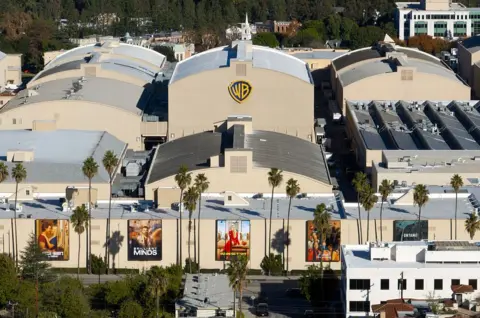 Getty Images
Getty ImagesWhether they're rooting for Paramount or Netflix or another potential buyer, the one thing people in Hollywood seem to agree on is this story's villain - Warner Bros Discovery CEO David Zaslav, who earned $51.9m last year as Warner Bros lost more than $11bn and the company's stock fell nearly 7%.
"I watched Warner Bros struggle since David Zaslav became the CEO and ran it into the ground," says an actor who lost his home after his work dried up. He did not want to be identified because he still hopes to work for Netflix and Paramount.
More than one person compared Mr Zaslav to the fictional movie character Gordon Gekko who proclaims "greed is good" in the 1987 movie Wall Street.
Mr Zaslav took over in 2022 during another massive merger of Discovery, Inc., which he ran, with AT&T's WarnerMedia, creating Warner Bros Discovery. The consolidation saw several thousand jobs cut - and lavish pay packages for Mr Zaslav.
"Zaslav is just Gordon Gekko – he came in, broke it and sold it all," says a producer who was working on the Warner Bros lot. "He said I will make all shareholders rich and who cares what the history of this place is."
Warner Bros objected to that characterisation.
"Under the leadership of David and the talented team at WBD over the past three and a half years, the studio has regained its leadership position with a unique slate of films led by original content, seen the relaunch of the DC Universe under a single unified leadership team with ten year plan and the streaming service has launched globally and become profitable for the first time ever," Warner's head of communications Robert Gibbs said in a statement to the BBC.
For many film workers, whoever buys Warner Bros has felt almost irrelevant. They have instead been focusing on how to reinvent themselves as the industry shrinks amid consolidation and the growing use of AI in entertainment.
"Every morning, no matter how much I tell myself to stay positive, I wake up feeling like I've failed in every direction," says an actor who is now homeless with his wife and two children, relying on the kindness of friends and food banks while he works odd jobs. He asked not to be identified out of fear it could impact future work.
"I would rather see Netflix purchase Warner Bros then foreign money," he says.
Others are not so sure. The tech giant has arguably been the industry's greatest disrupter since Warner Bros pioneered "the talkies" in 1927.
"I think it's a disaster," says a film exhibitor who did not want to be identified because they work with Netflix. "This is a company openly, proudly saying theatres aren't necessary anymore. That's scary. It's a nightmare."
Many theatres in the US refuse to screen Netflix movies because of their streaming-first strategy.
"At least with Paramount, we know movies will make it to the big screen. They didn't kill movie theatres," said one producer who has worked for all three companies.
Netflix has sought to alleviate those fears, saying they expect "to maintain Warner Bros' current operations and build on its strengths, including theatrical releases for films."
Many in Hollywood want to believe them.

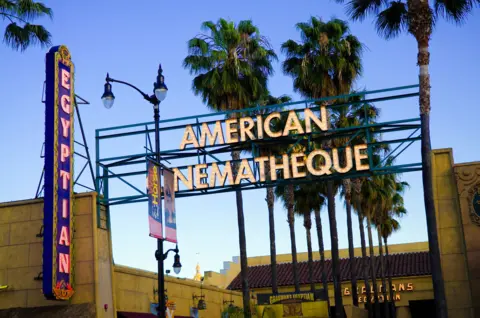 Getty Images
Getty ImagesJohn Evans, a sound technician who dabbles in acting, writing and producing, points to Netflix's loving restoration of The Egyptian Theatre along iconic Hollywood Boulevard as a sign of their good faith.
The Egyptian, a classic 1922 theatre, was the site of the world's first movie premiere – Robin Hood starring Douglas Fairbanks – and had fallen into disrepair before Netflix bought the property in 2020 and gave it a $70m makeover.
"I think it's a good sign," Mr Evans said, adding that streaming is how many film workers consume movies and TV like the rest of the world.
On the backlot at Warner Bros, tourists snap selfies in front of the Central Perk cafe set from Friends, and stroll by facades of buildings that stand-in for New York or Los Angeles. Inside the offices and writers' rooms, for those still working, it's business as usual.
"I've gone through seven mergers," a producer working on the Warner Bros lot said while developing a new show, explaining it's sad to lose a studio because it means it will be even harder to get shows made and sold with one less customer. "But if you make good stuff, you make good stuff."
The producer spoke on the condition of anonymity on the day that Paramount Skydance announced their hostile takeover bid. They said they were too busy to worry about the sale because they were trying to get a show on air – and they wouldn't be surprised if another billionaire or trillionaire made another offer for the studio by the end of all this.
"I joke about Elon walking in and doing this, but he could," they said of the Tesla and X owner. "When you have people worth a trillion dollars, there are no rules."

 Future Publishing via Getty Images
Future Publishing via Getty ImagesStanding around a kitchen island with a small group of other food writers, I pull on a pair of plastic gloves and begin massaging a bright red paste into wedges of cabbage.
We are in Korean-American TV chef Judy Joo's London flat, learning how to make kimchi from scratch.
Kimchi - sharp, funky, fermented cabbage - has become a kind of shorthand for Korean food in the UK. Judy calls it "the cornerstone of Korean cuisine".
"Traditionally, Koreans eat kimchi 365 days a year," Judy tells me. Kimchi recipes are passed down "like heirlooms", she adds.
The group joke about the chilli under our nails and the smell lingering on the train home, but we're all excited to have a jar of homemade kimchi ready to put in the fridge.
Judy, who's known for bringing Korean food to British audiences, was leading a class tied to Ocado's new Korean food aisle. It's part of what appears to be a growing trend of bringing Korean food further into the British mainstream.

 Judy Joo
Judy Joo
 Judy Joo
Judy JooGrowing up as a Korean in London, I was used to my culture turning up at school in the form of food. On "international day", my mum would be asked to send in Korean dishes for pupils to try. Teachers were often more curious than students, and there was usually confusion about whether it was another type of Chinese food.
Korean food has never been in competition with other Asian cuisines – it simply wants to be seen and tasted on its own terms. As more Korean restaurants have opened, and as I've gone back to Korea and explored its food there, I've watched that shift happen in both places.
Back in 2009, the South Korean government launched a "Global Hansik" campaign to raise the profile of Korean food abroad, putting public money into restaurant promotion, chef training and overseas marketing. The programme drew criticism at the time for lacking clear results but, later, government studies suggested awareness of Korean food in major overseas cities rose over the first half of the 2010s.
Since then, Korean food has increasingly travelled alongside the broader "K-wave" of pop culture. Food-centred drama Bon Appétit, Your Majesty has showcased Korean fusion dishes, while South Korean competition show Culinary Class Wars returns for a second season on Netflix this month after topping the platform's global non-English TV chart in its first run.
The shift is also visible on UK shelves. Searches for "Korean BBQ" on Waitrose's website are up more than 60% year on year, and sales of its gochujang paste have risen more than 70%. Kimchi is among its fastest-growing international products.
"Fermented foods, such as kimchi, have become mainstream," explains nutritionist Emer Lowry. "They enhance flavour and texture, but also offer benefits including improved digestion and a diverse, healthier gut microbiome."
And the interest in Korean food didn't just happen overnight - it's driven by curiosity. Analysis by Bibigo, part of food giant CJ, suggests TikTok posts by UK users mentioning Korean food have risen from just under 10,000 in 2023 to more than 17,000 in 2025.

 Lola Lee
Lola LeeAt Cálong, a restaurant in North London, chef Joo Won is exploring what it means to cook Korean food in Britain. In his early career in a London hotel kitchen, he worked with chefs from France, Italy, Spain, Greece and Thailand. Between shifts, they would take it in turns to cook meals from home for each other and, one day, the others asked him to make something Korean.
"When they asked me to cook Korean food, I realised I couldn't," he says. "As a Korean person and a chef, being unable to cook Korean food was embarrassing."
He began revisiting the dishes he grew up with, not just restaurant staples but the home cooking most non-Koreans never encounter. "In Korea, the real foundation of our food is jang," he says, referring to fermented pastes and sauces such as doenjang, ganjang and gochujang.
But ingredients in Britain are different. "We can't get exactly the same ingredients here that we have in Korea," he says. "So a big challenge is: how do we reinterpret the character of British ingredients in a Korean way?
"We're a restaurant that uses Korean techniques and flavours, but we also rely heavily on what's available here in the UK," he continues. "If an ingredient doesn't suit Korean seasoning, there's no need to put gochujang on it. If every dish at an Italian pasta restaurant came out with the same sauce, it would feel strange."
As the popularity of Korean food grows, Joo thinks chefs may find it easier to source the authentic products they need. "At the moment, I'd say we're only at the beginning. It feels like we've just reached the starting line."
Food is the most important part of Korean dining culture. But Yoonsun Chang - who runs a Korean supper club - says Jeong, a deep warmth and care often associated with Korean hospitality, and inyeon, a sense of meaningful connections formed at the table, are also key. "What I try to give is jeong, but what's created through these gatherings is also inyeon."
LoKoLi – short for "Lovely Korean Life" – is a one-woman project run by Yoonsun, who creates one-off dining experiences built around Korean food and culture. I first came across her on Instagram and was struck by how much of it she was doing alone, driven by her own desire to show a version of Korean life that reflected what she loved.
Guests at her monthly clubs, which she usually hosts at home, often say they want more than the obvious elements of K-culture. They already know the music and dramas. What they're seeking is the quieter, domestic side of Korean life: the table setting, the stories behind everyday dishes.
She also pays close attention to how Korean food appears outside Korean spaces. She recalls a time when "kimchi burgers" in Britain used "just some generic pickles". Now, she says, pubs and restaurants increasingly use real kimchi. "Seeing that makes me feel Korean culture has really spread," she says.
For British YouTubers Armand and Max, their introduction to Korean food came after taking part in a viral video for the Korean Englishman YouTube channel. Now in their early 20s, they say that day changed the way they eat.
The video, which featured the pair trying Korean street food in their school playground, was seen by tens of millions - and eventually took them to Korea itself, where they tried barbecue, late-night ramyun and school lunches.
"The flavour profiles… were just so different to what we were used to," says Max. "Fermented cabbage, kimchi, we'd never had that. That was delicious. I can't even compare it to anything."

 Korean Englishman
Korean EnglishmanBack in Judy's kitchen, as cabbages disappear into jars, she explains that proper kimchi needs weeks to ferment, though we were encouraged to taste it as it developed - as people do when making it at home.
The jar I made that day is now bubbling away in my fridge. It's not the kind of kimchi my family would have made, but the process - rubbing paste into each leaf, waiting for the tang to deepen - connects back to kitchens thousands of miles away.
Korean food in Britain is still young compared with other cuisines. It has not replaced anyone's Friday-night takeaway. But from supper clubs and YouTube channels to supermarket aisles and small flats where people are learning to make kimchi for the first time, it is steadily becoming part of everyday life.

 Rockstar Games
Rockstar GamesDan Houser was one of the masterminds behind revolutionary video game series Grand Theft Auto.
Now, after leaving Rockstar Games and launching his own company, he's released a debut novel about a very different type of game.
A Better Paradise is a dystopian vision of the near future in which an AI-led computer game goes rogue.
Set in a polarised world, it finds Mark Tyburn attempting to create a virtual haven for people to find sanctuary and reconnect within themselves against an all-consuming social media hellscape.
But it all goes wrong when it ends up unleashing a mysterious, sentient AI bot named NigelDave into society - "a hyper-intelligence built by humans" - flaws included.
Readers get to see his thought processes as he struggles with "infinite knowledge and zero wisdom".
"What would an incredibly precocious child, who remembers everything he ever thought - because computers don't forget things - feel like when he started talking?" Houser says.

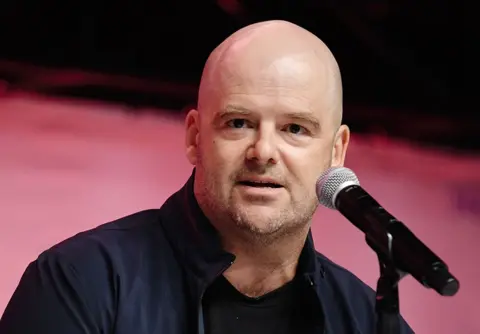 Getty Images
Getty ImagesIt feels a bit like A Better Paradise predicted the future.
First released as a podcast, the book comes as AI's continued boom means the sector's big seven companies are now collectively worth more than China's economy.
But Houser says he began writing the book "a good year" before OpenAI's ChatGPT went live to the masses in 2022, complete with a logo eerily similar to his fictional creation.
Instead, it was humanity's technological dependency during Covid - at a scale he'd underestimated - that inspired his thinking.
In his novel - which sometimes feels monologue-heavy - Houser envisions a hyper-digital, alienating world where people retreat from deepening political problems into a spiral of social media and generative AI.


Enter CEO of Tyburn Industria, Mark, who dreams of building the Ark, an immersive gaming experience users can enter in order to reconnect with themselves. It generates a world and mission tailored to each player's innermost wants and needs.
But during testing, the Ark becomes a Pandora's box of addiction. Some players find joy; others encounter terror. One even reconnects with his dead sister.
Meanwhile, a rogue AI bot named NigelDave slips into the real world, controlling minds and engineering realities no one can control.
Mined for advertising, people are left wondering if their thoughts are genuine. Everything is tracked, and nothing is secure. As climate emergencies intensify, society falls to pockets of civil war.
The only way to escape is to "drift"- which means hiding from a thousand algorithms by living off-grid, constantly moving and suppressing maddening paranoia that your thoughts are not your own.
To the reader, NigelDave feels like a nightmare ChatGPT gone wrong.
The AI tool recently reached 800 million weekly active users, according to boss Sam Altman, and Houser believes some people are becoming dependent on the technology's affirming "human veneer".
Microsoft's head of AI Mustafa Suleyman has warned of a rise in AI psychosis - a non-clinical term describing incidents where people increasingly rely on chatbots like Claude, Grok and ChatGPT and become convinced that something imaginary has become real.
In some cases, the chatbot fuels grandiose fantasies about future opportunities. In others, it presents in a romantic connection. More troubling are reports of parents saying bots have encouraged their children to kill themselves.
In response to the increased scrutiny, ChatGPT creator OpenAI recently tightened its welfare protocols, with updates designed to ensure its chatbot responds "safely and empathetically to potential signs of delusion or mania".

 Bloomberg via Getty Images
Bloomberg via Getty ImagesThe dizzying algorithm-fuelled society in which NigelDave is unleashed mirrors ours too.
Parents worry about exposing their children to false information or harmful content. Last year national police chiefs described the "quite terrifying" misogynistic radicalisation of boys and young men. And in 2014 Facebook admitted manipulating the news feeds of nearly 700,000 users without their consent to manage the emotions they were exposed to.
"As a parent, you always worry about anything that you expose your kids to that is going to either give them false information or simply bombard them with too much information," Houser says.
But is it bold for a video game creator to be warning of these dangers - given the long history of video games themselves being accused of making young people violent?
Houser insists there's a difference.
"We always had the data about game violence, and it was very clear: as people played more video games, youth violence went down.
"Whatever people were claiming, we knew the opposite was true."

 Getty Images
Getty ImagesPsychology professor and game violence researcher Pete Etchells says numerous studies have shown "no meaningful effect of playing violent games on aggression".
AI models and social media are another matter - a "new paradigm" in altering behaviour that gaming never threatened, according to Matt Navarra, social media consultant and author of the Geekout Newsletter.
He says dismissing concerns as a GTA-style moral panic "understates what is changing".
"We're talking about external systems that can potentially shape people's beliefs or manipulate attention, personalised experiences, nudge behaviour or even influence identity and emotional states."
Could Houser have pushed forward with A Better Paradise at Rockstar? "I don't know if I would have had the bandwidth to think about it," he tells me.
He's previously described the fatigue of managing vast open-world sandbox games like Red Dead Redemption and GTA as playing a role in his departure.
The goal with his book was to create "something truly different in this era of crazy media saturation".

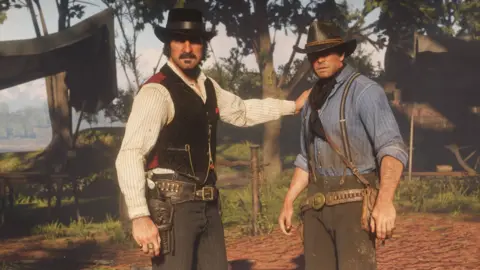 Rockstar Games
Rockstar GamesSo where next? He's already writing the second instalment of the series, and plans are under way to develop a video game, for which he promises the visuals are ground-breaking.
A key message, he says, is to not let your device - or AI - "tell you what to think". Otherwise, Houser argues, "you're giving up control to your phone".
His biggest fear, as creator of worlds, is losing imagination because of the endless torrent of algorithms. Sometimes after scrolling for hours, he realises: "I've not had an idea all day".
"If you go offline for a bit - sometimes I make myself go for a walk with no phone, you start to have ideas.
"A human is better thinking than not," he says. "Thinking is a privilege."
If you've been affected by issues involving suicide or feelings of despair, details of organisations offering advice and support for people in the UK are available from BBC Action Line. Help and support outside the UK can be found at Befrienders Worldwide.

 Hedi Stanton
Hedi Stanton"When are you interviewing Haim?" my sister Emily texts, late one night. "I wanted you to ask if I can be their fourth member."
There's just one problem: I also want to be Haim's fourth member. And we're not alone. Taylor Swift and actress Brie Larson have also begged for the position.
Fellow Oscar-winner Emma Stone even teamed up with them for a Spice Girls tribute although, sadly, that wasn't a permanent deal.
There's clearly something going on.
Sisters Este, Danielle and Alana began their career playing gigs at local delicatessens with their parents. Now they're multiple Grammy nominees.
Like all the best bands, they're a tight-knit gang. Their videos often show them striding in unison down the streets of Los Angeles. On stage, they play with such unfettered joy you can't help but think, "I want to be part of that, too."
"The amount of times on tour that young girls came up to us and said, 'After your show, I got a guitar, I picked up drum sticks, I picked up a bass'," says Alana, the youngest of the Haim siblings. "That's the biggest honour. That's an award in itself. We've done our job if we can inspire young girls to start a band.
"So everyone is invited to be the fourth Haim sister."
(Emily, you're in!)

 Getty Images
Getty ImagesThe band have called into the BBC from home, where they're resting up after an extensive tour in support of their fourth album, I Quit.
They're currently reeling from the news it's been nominated for best rock album at the Grammys - with Haim the first all-female band ever in contention for the prize.
"I watch the nominations every year, so it kind of feels like The Truman Show when your name is read out," says Alana. "I had to call my sisters to say, 'Did I hear this right or am I hallucinating?'"
The significance of the nomination isn't lost on the trio.
"We really set out to make a rock album this time, so it's a huge milestone," says Alana. "But we're just grateful for the women that came before us.
"All we looked up to were women rock artists," adds Este. "That was our world, growing up, whether it be Stevie Nicks, or Joni Mitchell, or Pat Benatar."
The record emerged from a period of emotional upheaval. All three sisters found themselves single, and the music inhabits that strange liminal space where you're relieved to be free, but not quite ready to move on.
"Can I have your attention, please, for the last time before I leave," sings Danielle, over an Americana-style acoustic guitar on the opening track, Gone.
Then: "On second thought, I changed my mind."
Este takes over the vocals on Cry, tracking her progress through the seven stages of grief. "I'm past the anger, past the rage / But the hurt ain't gone."
There are a lot of departures, a lot of goodbyes. The sisters want love, but not the specific love they've got. You can hear them working out in real time who they want to be, and refusing to be defined by how others see them.
"I love that description, yes," says Danielle. "I Quit is kind of like a mantra. You have to actively work on shutting out the noise and saying, 'I don't give an [expletive] what people think'.
"When we were in our 20s, I wasn't strong enough to say something like that," says Alana, picking up the theme.
"I was more like, 'Oh, please love me'.
"But by the time we get to I Quit, I'm like, 'Screw this, I'm done'. And with that comes an inner strength that I'm very proud to have."


That toughness required a new sound - more raw and immediate than anything the band had done before.
For Danielle, who co-produced the album with Rostam Batmanglij, formerly of Vampire Weekend, that started with the drums.
She plays an acoustic kit on every track, often layering multiple takes, recorded in different studios to capture specific tones. On Everybody's Trying To Figure Me Out, she even tuned her snare drum to match the "iconic" thwack of U2's Sunday Bloody Sunday.
"Drums are such a nuanced like thing, and I care so much about it, so much," she says, as if that wasn't abundantly clear already.
"'Journey of the drum sound' will be the name of our memoir," laughs Alana.
"I've said it a million times, our albums don't start until we find the perfect drum sound, and then we can continue on the journey of writing the songs."

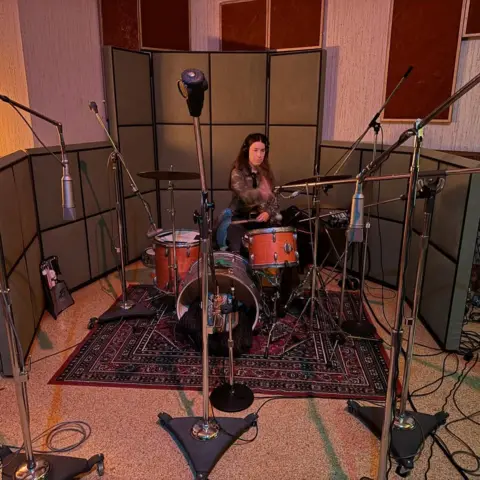 Haim / Rostam
Haim / RostamThe evolution of Haim's sound also helped them grasp songs that had slipped through their fingers over the last decade.
I Quit's first single Relationships is a glossy pop earworm that first came to Danielle on a flight home from Haim's 2017 Australian tour.
In the intervening years, it went through "hundreds" of re-writes, changing lyrics and tempos, before finally "coming to life" at Batmanglij's home studio.
By contrast, Take Me Back was made up on the spot, as the band shared raucous stories from their high school days - of boys who couldn't perform in bed and friends who lost control of their bowels "in the back of a truck".
"That one fell into place so quickly," says Alana. "We didn't even know if it was going to go on the album.
"It was just us riffing from the heart and being like, 'This is the kind of song that we want to make today', with no pressure. We were laughing through the whole experience.
"At the end of it, we were like, 'This is hilarious, we've got to put it on the album'."
That candour inspired the album's promotional campaign, where the sisters shared some of their dating horror stories.
One man broke up with Este when she told him their future children might have Type 1 Diabetes. He was like, 'Then why are we here?'" she recalls.
Alana shared the story of travelling to London to spend New Year's Eve with a musician she thought she was dating, only for him to high five her at midnight.
On tour, fans shared their own disaster stories on Haim's video screens.
Among them was a girl in Philadelphia who discovered her boyfriend's private safe contained neither money nor passports, but a shrine to his ex... And his mum.
"When you're going through these heartbreaks, you just feel like there's no light," says Alana.
'So to be able to laugh at those stories and share them with other people, and then have them tell you even crazier stories, it's so amazing.
"We can laugh at all these things, and it's not going to keep us from trying to find love in the future."

 Jono White
Jono WhiteIt's not difficult to sense a shift in the band. The first time we met in 2012, they were still wet behind the ears, and giddy from making their debut at London's O2 Arena.
As the support act for Florence + The Machine, the sisters were overwhelmed at the realisation they'd just played the same stage as The Rolling Stones.
"I've been crawling on the floor, trying to soak it all up," said Alana. "I think I have a little Mick Jagger in me."
These days, Haim are more confident of their place in the rock pantheon.
They're festival headliners, with two number one albums and an international fan base.
Not only that, but they have successful side hustles in acting (Alana has just been "shot in the head by Sean Penn" in One Battle After Another) and soundtrack work (Este's credits include The White Lotus and Loot).
But Haim will always be their number one priority.
"Me and my siblings have been playing music since I was four years old," says Alana.
"It's like there's nothing else that we were supposed to do. And I'm really grateful we've gotten here and we're still kicking."

 Rachael Parnell
Rachael ParnellWhen Rachael Parnell heard Aldi was selling a new skincare range that looked similar to products from luxury brand Augustinus Bader, she was "super excited".
She rushed to her nearest store to pick up the Lacura face cream for £8.49 for 50ml - a fraction of the £240 price tag of the Augustinus Bader 50ml product.
The sleek blue tube and gold lid of both products look remarkably similar. And though Rachael has never tried the high-end cream, she says she's impressed by the product so far.
The BBC reached out to Aldi about the likeness of the product packaging - but they have not provided a comment.
Rachael has been buying skincare dupes from high street stores and supermarkets for years, and she's not alone.
More than a quarter of UK shoppers say they've bought a skincare or makeup dupe. This rises to 44% among 18-34 year olds, according to a survey by Barclays in February.
Dupes are skincare products that mimic bigger name brands and provide budget-friendly alternatives to high-end products. They often have similar names and packaging, but in some cases the ingredients can vary significantly.

 Victoria Woollaston
Victoria WoollastonRachael, 34, from Warwickshire, says she's attracted by the low prices of budget alternatives and often finds the quality good.
When asked about two cleansing balms she has bought - one from a high-end brand and the other a low-priced equivalent - she says: "It's the same to me, I can't tell the difference."
Skincare experts say some alternatives to high-end brands are good quality and help make skincare more affordable.
"I don't think more expensive is necessarily better," says consultant dermatologist Sharon Belmo. "Not every low-budget skincare brand is bad - and not every luxury skincare product is the best."
"Some [dupes] are absolutely amazing," says Scott McGlynn, who hosts a podcast in which he asks celebrities about their skin routines.
Many of the products inspired by luxury brands "sell out so fast, it's just insane," he says.

 Scott McGlynn
Scott McGlynnAesthetic and dermatology doctor Ross Perry thinks dupes are fine to use for "basic skincare" like moisturisers and cleansers.
"Dupes will serve a purpose," he says. "They will do the basics to a reasonable level."
Ketaki Bhate, a consultant dermatologist, thinks you can save money when you're looking for single-ingredient products like hyaluronic acid, niacinamide and squalane.
"If you're buying a single-ingredient product then you're probably going to be okay in using a dupe or something which is quite low cost because there's very little that can go wrong," she says.
But the professionals also suggest consumers do their research and say that more expensive products are sometimes worth the extra money.
With luxury skincare, you're not just paying for the brand and marketing - sometimes the higher price tag also comes from the ingredients and their quality, the concentration of the active ingredient, the technology used to develop the product, and studies into the products' effectiveness, Dr Belmo says.
Facialist Rhian Truman says it's worth thinking about how some dupes can be sold so cheaply.
In some cases, she says they could contain filler ingredients that don't have as many benefits for the skin, or the ingredients might not be as well sourced.
"The big question mark is 'How is it so cheap?'" she says.
Podcast host Scott says in some cases he's bought skincare items that look similar to a big-name brand but the product itself has "no resemblance to the original".
"Don't be sold by the packaging," he added.

 SimpleImages/Getty Images
SimpleImages/Getty ImagesFor more complicated products or ones with ingredients that can irritate the skin if they're not formulated correctly, such as retinols or vitamin C, Dr Bhate recommends sticking to more specialised brands.
She says these will likely have been through expensive trials to evaluate how effective they are.
Skincare products need to be tested before they can be sold in the UK, says consultant dermatologist Emma Wedgeworth.
If the brand makes claims about the effectiveness of the product, it needs data to back it up, "but the seller doesn't necessarily have to do the testing" and can instead reference testing done by other brands, she says.
Are there any ingredients that could indicate a product is low-quality?
Ingredients on the back of the bottle are ordered by quantity. "The baddies that you want to look out for… is your mineral oil, your sodium lauryl sulfate, parfum, benzel peroxide" being high up on the ingredients list, Miss Truman says.
The BBC sent ingredients lists of two BHA 2% salicylic acid toners with similar packaging to Dr Bhate. One is typically sold for six times the price of the other.
Dr Bhate says the the list of active ingredients in both products "looks pretty similar, no red flags," but she notes the products have different formulations with solvents and humectants, which break down ingredients and hydrate the skin respectively.
"This will likely lead to varying performance between the two products," she says.
Dr Bhate also looked at the ingredients lists for two serums with similar branding, one from a luxury skincare brand and one from a supermarket.
She says that though they have "lookalike packaging", the budget product "doesn't appear very similar in terms of ingredients" and the higher-end formula "seems more complex with barrier lipids and more marine extracts".
But for many people, trying to analyse the ingredients list on a bottle of moisturiser, cleanser or serum can be overwhelming.
"Sometimes it feels like looking at the back of a skincare product ingredient list is like having a chemistry lesson," says Riya Asher, a pharmacist and aesthetic practitioner.
She recommends focusing on how high up the active ingredient - the one that triggers the effect, like retinol or vitamin C - is in the ingredients list. And if you're not sure which is the active ingredient, she recommends doing your research online.
And Dr Belmo says you should focus on your skincare concerns when scanning the back of bottles, such as avoiding oils for acne-prone skin or staying fragrance-free for sensitive skin.

 Victoria Woollaston
Victoria WoollastonVictoria Woollaston posts reviews of skincare products on her website, Mamabella.
She's tried both an Augustinus Bader serum and the new product sold by Aldi, and tells the BBC the supermarket serum felt thinner, but that because Augustinus Bader's is stronger it could cause irritation for some people.
Victoria feels like there's a "perfect storm" for skincare dupes to become popular, as the cost of living crisis pushes shoppers to seek value for money and people have become more interested in the ingredients in their skincare products.
She says these companies aren't stealing customers from luxury beauty brands - in her opinion, many of the people who buy budget alternatives would never have been able to afford the high-end products in the first place.
"What my years of tests show," says Victoria, "is that value and efficacy can 100% coexist."









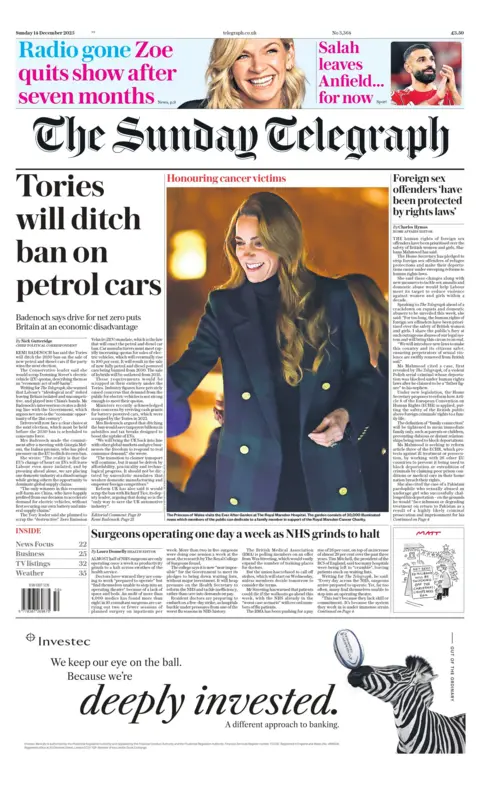



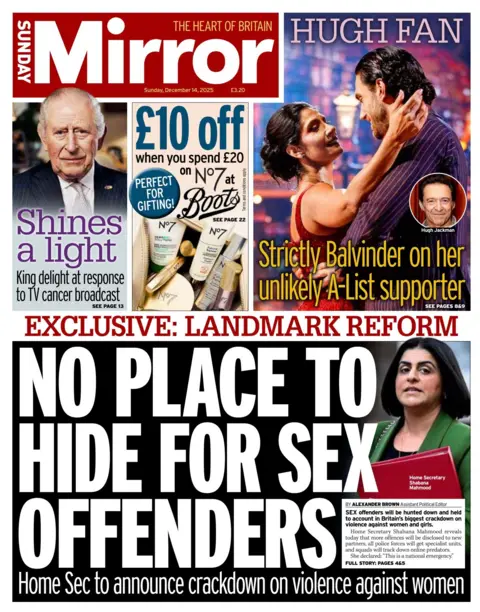

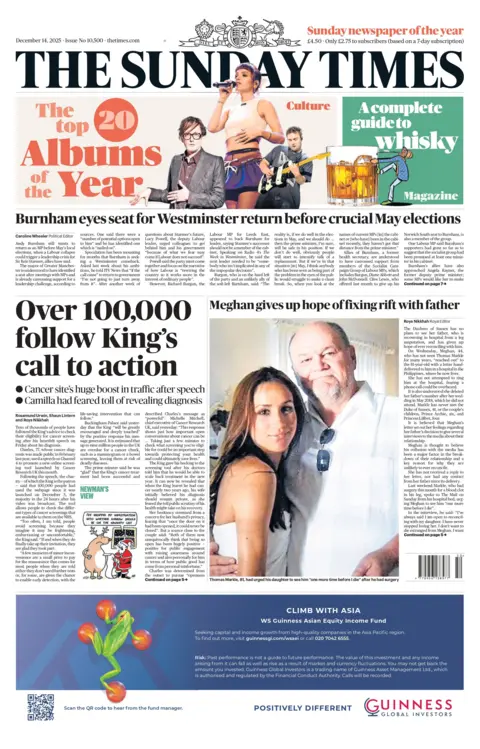

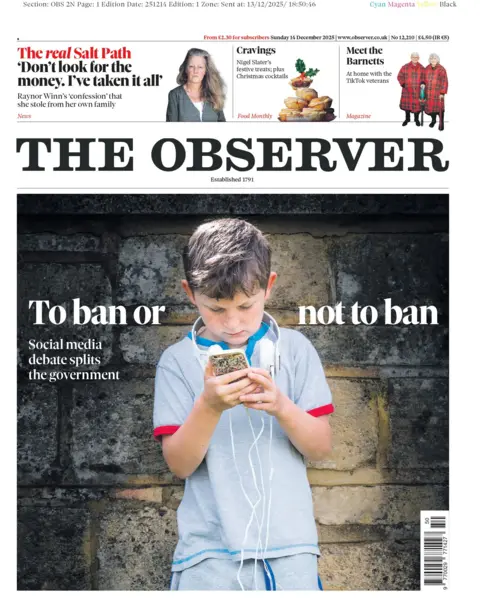




Sign up for our morning newsletter and get BBC News in your inbox.



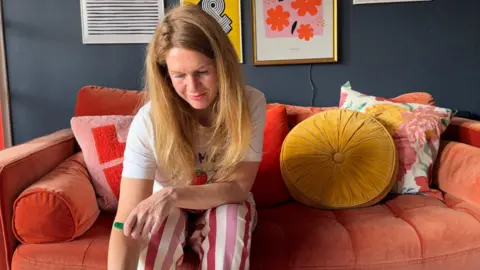 Rachel Verney
Rachel VerneyWhile some get a boost of happiness by exercising and getting enough sleep, others are turning to interior design with bold paint and eye-catching patterns.
It is a craze known as "dopamine decor", which has more than 70,000 posts on TikTok, and involves adding bright, quirky items to your home for a happiness boost.
Rachel Verney shares decor inspiration videos of her colourful Surrey home to more than 800,000 followers on social media and she saw her popularity boom when she bought a bright orange sofa.
Known as The Shoestring Home, millions watch her renovation videos as she aims to make "aesthetic accessible" and help people create colourful spaces on a budget.
"It's my happy place when I work on a project," she said. "Sometimes I feel like an imposter as I'm not qualified to do the job."
On Facebook, she has experienced "division" over her interiors as some find the designs too bold.
But while she might not have a degree in interior design, her ideas have been a hit with younger viewers and she has made content creation her full-time job over the past year.
"Everything is so gloomy and the world is a bit of a scary place at the moment - houses want to be joyful," she said.

 Rachel Verney
Rachel VerneyDopamine is a neurotransmitter that plays a crucial role in our brain's reward and pleasure systems. Often referred to as the "feel-good" hormone, it influences mood, motivation, and attention.
Psychologist Dr Natasha Sharma said vivid colours produced small dopamine hits, which, in uncertain times, provided a sense of optimism and reward.
She said dopamine decor allowed people to "externalise" their identity and boost their mood, giving a "heightened sense of wellbeing".
Dr Sharma, from Wolverhampton, added that a home dominated by grey or neutral tones could result in "feelings of emotional flatness".

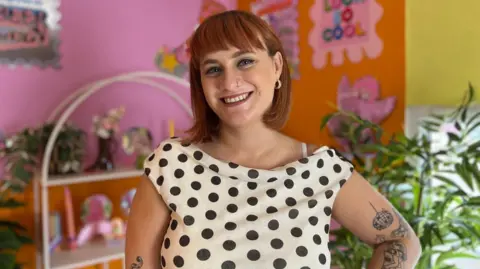 Alice Cullinane/BBC
Alice Cullinane/BBCNicola Brighton is among those making a living from the trend, creating kitsch prints and neon mirrors in unique shapes which are stocked in stores across the UK and US.
Since 2022, her business Printed Weird, which is based in Birmingham, has grown 62% and her designs frequently sell out as customers look for nostalgia to add to their homes.
"When you come home from work and you've had a rubbish day, you can just look at things that bring you joy and happiness," Nicola said.
She started her business from her mum's spare bedroom seven years ago, fuelled by a love for colourful decor and a mission to put affordable items on the market.
"Through what you love, why not put that silliness on your wall? It's an extension of your personality and will bring you joy," she said.

 Rachel Verney
Rachel VerneyBut while Google searches for dopamine decor have risen more than 110% in the past year, estate agents warned the trend could put off potential buyers.
Paul Fox Estate Agents, based in Lincolnshire, recommended a neutral colour scheme over bold hues, adding "timeless" shades helped sell homes quickly.
"First impressions are everything, so by ensuring that the home is painted in popular colours you are likely to attract buyers," the agent said.

 Alice Cullinane/BBC
Alice Cullinane/BBCDespite the agent's advice, new homeowners like Jodie Edmonds have decided to add personality to their walls.
"I'm not bothered when it comes to reselling, people have different tastes and can change the decor," she said.
For Jodie, a colourful scheme is a way to express herself and make guests feel happier.
"A grey house would make me feel low, a bright house makes me feel motivated and inspired," she said.
Follow BBC Birmingham on BBC Sounds, Facebook, X and Instagram.

 Mahad Mohamud
Mahad MohamudMahad Mohamud is slowly readjusting to the heat, chaos and tension of Somalia's capital, Mogadishu, after being deported from the US city of Minneapolis last month just as winter was closing in there.
Somalis know the 36-year-old as Garyaqaan - a word that can be translated as "judge".
This is the name he uses on TikTok, where he attracted almost half a million followers while he was abroad. Fans praised Mahad for his defence of his clan's interests - part of Somalia's lucrative TikTok roasting sub-culture.
But to those running the White House-linked "Rapid Response 47" X account, Mahad was a "criminal illegal scumbag". In an October post it accused him of being "involved in the kidnapping of French officials" from a hotel in the Somali capital.
Mahad has denied the allegation, saying that he was not in Mogadishu at the time. He was never convicted and the case was dropped.
He says his detention by the US Immigration and Customs Enforcement (ICE) agency was triggered after a rival TikToker leaked his address.
"ICE told me they had two cases against me - one was entering the country illegally and the kidnapping of a French official."
Mahad said the kidnapping case was handled by the FBI and after questioning, they cleared him.
But that didn't save him from being deported.
His journey from Somalia to the US started more than a decade ago and first took him to South Africa, where he lived until 2021. But he says he was assaulted by armed men in a xenophobic attack.
He then went to Brazil and made his way north, eventually crossing into the US, without documentation, through the Mexican border.
"When I jumped the fence from Mexico, I was arrested and detained for a month," Mahad says.
"I was later released with a work permit because my asylum case was active."

 Andaou via Getty Images
Andaou via Getty ImagesHe then made his way to Minneapolis. "I used to work as an Uber driver. I was happy to finally be in the land of dreams. I hoped they would accept me."
His TikTok career also took off which gave him a steady income as fans sent him gifts as they watched his live streams. It also led to a threat on his life from the Somalia-based Islamist militant group al-Shabab because of his defence of the government.
Part of his asylum case in the US was based on that threat.
Mahad describes in vivid detail the early May morning when immigration agents arrested him this year.
Shortly after he had eaten breakfast, he went to his car thinking he was about to begin another day of Uber driving.
"Boom, they came for me," he says.
According to Mahad, he was taken on a 30-minute drive to the ICE headquarters serving Minneapolis and its twin city of St Paul, before being transferred on a six-hour journey to Kandiyohi County Jail Prison in Willmar, Minnesota, where he says he spent six months in detention.
He tells the BBC that three of those months were spent waiting for a decision on his asylum case, and the remaining three awaiting deportation. The authorities denied his asylum claim as they rejected the idea that he would be in danger in Somalia.
Mahad says there were brief periods when he was transferred to Arizona, from where deportation fights leave, but he was told on each occasion that logistical arrangements were not ready.
On one of these trips, he was part of a group of 39 detainees, including nationals of Kenya, Ethiopia and Eritrea, in a holding area for people waiting to board deportation flights.
Finally, when it came to his own departure, Mahad says he was put in a tight restraining jacket and travelled on a small plane with seven other deportees and some guards.
The journey first took them to Costa Rica, in Central America, then to Senegal in West Africa, before flying to Kenya's capital, Nairobi. There Mahad says the restraining jacket was removed and he was handcuffed and put on another plane to Mogadishu.
Having spent three months waiting to be deported, Mahad had already resigned himself to his fate and was not particularly emotional on his return.
After a decade apart, he has finally been reunited with his three children. "I wouldn't trade this moment for anything now... I haven't seen them for 10 years," Mahad says.
But he would still prefer to be in the US because he fears for his life after receiving text messages from al-Shabab, containing death threats.
He takes extra security precautions when he's out and lives in a well protected home but did not want to go into further details, or share the contents of the threats, for safety reasons.

 Getty Images
Getty ImagesOn his return, Mahad was welcomed by many people from his clan, including local politicians, because of his TikTok profile. He understands that because of his social media presence he may get opportunities not available to other Somalis deported - or threatened with deportation - from the US.
Last month, President Donald Trump said he would end the temporary protection status that is supposed to prevent people from being deported while their home country is unsafe.
Earlier this month, he upped the ante, saying that he does not want Somali immigrants in the US, telling reporters they should "go back to where they came from" and "their country is no good for a reason".
Somalia has not had a central government in control of the whole country since the toppling of President Siad Barre in 1991. People have had to endure years of near anarchy and insecurity - and even now, despite a government being in place in Mogadishu, Islamist militants still dominate much of the country and occasionally stage attacks in the capital.
Trump's comments came after he was questioned about large-scale fraud in the state of Minnesota's social assistance programme.
Dozens of people have been charged over a scheme that federal prosecutors say involved a charity fraudulently billing the state's government for meals for children during the Covid-19 pandemic.
A number of Somali immigrants were implicated in that alleged scheme.
In the wake of the president's remarks about Somalis, videos have circulated on social media appearing to show immigration agents knocking on doors across Minneapolis, which includes an area known as Little Mogadishu, and St Paul.
For many in the city's Somali community, the largest in the US and numbering around 80,000, the posts have triggered alarm.
The BBC also spoke to five young Somali men who now spend their days confined to a friend's small house, moving carefully through rooms that are not their own. They left their rented apartment abruptly last week not because they wanted to, but because the lease was under their names.
As people who had been given temporary protected status, they feared it was only a matter of time before ICE traced the address and came for them. They grabbed what they could carry and slipped away in the night, hoping the change of location would offer some protection.
Now, their lives are suspended. Work shifts are missed. Meals are skipped or stretched. One of the men described how quickly everything has collapsed: "We're running out of food. We haven't reported to work for the past five days because we're scared that ICE might be waiting for us. I don't know what will happen to us."
Mahad is far from being alone in being deported to Somalia in recent months, although there are no official figures.
The BBC also spoke to another young Somali man, who asked to remain anonymous. He said he was struggling to rebuild his life back in Mogadishu.
From rural Somalia, he was desperate to leave as a prolonged drought had destroyed his livelihood. He illegally crossed into the US through the Mexican border after travelling north from Brazil but was detained shortly after. He spent 18 months in custody before being returned to Somalia.
Speaking on the phone, he describes feeling uncertain about his future.
"They sent me back to start from zero," he says. "Everything I worked for just disappeared."
He says he spent around $20,000 (£15,000) to reach the US, including money he had borrowed from friends and family.
Since returning home, he has had no money and says there are no opportunities in Somalia.
"I don't see a future here," he says. "There is nothing going on… no employment."
He is now considering migrating once more.
"I don't want to start life again. I just want to migrate to any country now."

 Getty Images/BBC
Getty Images/BBCGo to BBCAfrica.com for more news from the African continent.
Follow us on Twitter @BBCAfrica, on Facebook at BBC Africa or on Instagram at bbcafrica
中国财政部称,要准确把握明年经济工作的总体要求和政策取向,用好用足各类政府债券资金,发行超长期特别国债。
据中国财政部官网消息,中国财政部部长蓝佛安上星期五(12月12日)主持召开党组会议,传达学习中央经济工作会议精神,研究财政部门贯彻落实工作。
会议认为,此次的中共中央经济工作会议,是中共二十届四中全会之后中央召开的一次重要会议。中共总书记习近平在会议上发表的重要讲话,全面总结2025年经济工作,深刻分析当前国内外形势,系统部署2026年工作,具有很强的战略性、思想性、指导性,既举旗定向、指明“十五五”开局路径,又谋篇布局、擘画明年抓落实重点,为做好财政工作指明了前进方向、提供了根本遵循。
会议称,按照中央经济工作会议部署安排,明年政策取向上,要坚持稳中求进、提质增效,发挥存量政策和增量政策集成效应,加大逆周期和跨周期调节力度,提升宏观经济治理效能。财政部门要准确把握明年经济工作的总体要求和政策取向,保持必要的财政赤字、债务总规模和支出总量,提高政策精准性和有效性。
同时,用好用足各类政府债券资金,发行超长期特别国债,持续支持“两重”(国家重大战略实施和重点领域安全能力建设)建设、“两新”(大规模设备更新和消费品以旧换新)工作。
此前,为期两天的中央经济工作会议上星期四(12月11日)在北京闭幕。习近平主持会议并发表讲话,分析当前经济形势,部署明年经济工作。
新华社报道,回顾今年经济工作时,会议称“经济社会发展主要目标将顺利完成”,意味着5%左右的增长目标大概率实现。
会议提出,在政策取向上要加大逆周期和跨周期调节力度;继续实施更加积极的财政政策;保持必要的财政赤字、债务总规模和支出总量;重视解决地方财政困难;继续实施适度宽松的货币政策;把促进经济稳定增长、物价合理回升作为货币政策的重要考量,灵活高效运用降准降息等多种政策工具;保持人民币汇率在合理均衡水平上的基本稳定。
中日关系紧张之际,日本防卫省称中国海军航母辽宁舰早前在太平洋海域,共实施了约260次舰载战机和直升机的起降训练。
据日本共同社报道,日本防卫省统合幕僚监部上星期五(12月12日)发布消息称,发现辽宁舰12月6日至12日在太平洋海域共实施了约260次舰载战机和直升机的起降训练。
日本防卫省统合幕僚监部也提到,辽宁舰上星期五与导弹驱逐舰等一同从冲绳本岛与宫古岛之间向西北方向航行,驶离太平洋。
中国航母打击群近期在靠近日本的海域航行并举行演练。日本指中国辽宁号航母舰载机歼-15于12月6日在冲绳岛东南方向的国际海域,两度对日本航空自卫队F-15战机进行雷达照射。
战机雷达用于导弹发射准备阶段的火控以及对周围的搜索。
日本内阁秘书长木原稔12月8日表示,日方会冷静而坚定地作出回应,并继续监视中国军队在日本周边海域的动向。

© Tony Luong for The New York Times
上海媒体报道,所有上海航空实际承运的回沪航班上都已推行沪语广播。
据澎湃新闻星期六(12月13日)报道,有上海旅客在社交平台分享,在上海航空的飞机上听到沪语广播。
澎湃新闻从上海航空获悉,今年是上海航空成立40周年。目前,所有上航实际承运的回沪航班上都已推行沪语广播。
据上海航空微信公众号此前消息,上海航空“沪语广播”首批试点航线在8月26日起开始执行,共涉及四条航线。
上海航空是中国东方航空股份有限公司的全资子公司。
中国今年的电影市场回暖,全年总票房已突破500亿元(人民币,下同,91.12亿新元)。
综合中新社和证券时报网报道,影视票房平台灯塔专业版数据显示,截至星期六(12月13日),中国2025年电影全年总票房已突破500亿元。这是在2024年市场相对下滑后,总票房再次回到500亿元上方,也是继2017年、2018年、2019年和2023年之后,中国电影年度票房第五次突破500亿元大关。
数据显示,目前全年观影人次接近12亿,放映场次达1.37亿场,平均票价较去年有所下降,为41.9元。
票房排名前十的影片中,有四部产自春节档、四部产自暑期档、另外两部分别产自9月和11月。其中,《哪吒之魔童闹海》以154.46亿元位居榜首,《唐探1900》和《疯狂动物城2》分别位居第二和第三名。
灯塔专业版数据分析师陈晋说,在档期尚有十几天才结束的情况下,2025年贺岁档票房目前已超37亿元,大幅超过去年贺岁档30.5亿元的最终成绩。
陈晋认为,随着下周《阿凡达3》上映,今年贺岁档有望向中国影史该档期最高票房纪录发起冲击。
有民众向媒体投书称,台湾民众的中国大陆籍男性配偶近年成长27.8%,而同性婚姻中有九成是大陆男性娶台湾男性,恐引台湾国安疑虑。对此,台湾内政部回应,大陆籍男性配偶成长原因是因冠病疫情期间基期较低,从去年9月至今年10月,共计130对登记,其中男性45对,并无报道所称其中九成是大陆男性娶台湾男性的情形。
Newtalk新闻12月2日刊发一篇民众投稿的文章称,台湾内政部资料显示,2020年至2024年,大陆籍男性到台湾结婚的年均成长27.8%,2024年达1827人,是大陆籍女性的两倍,并质疑称“当对岸连自己的同性婚姻都不承认,却急着把‘男同志’送来台湾结婚,我们真的相信那只是爱情吗?”
对此,台湾内政部星期六(12月13日)发布新闻稿回应,2020年至2024年台湾人的大陆籍男性配偶人数成长27.8%,主要是因为统计的起始2020年正值疫情边境管制,因此当年的年度男性大陆配偶结婚人数为269人,基期相对较低;待疫情解封后结婚登记出现递延效应,“故2023年1617人及2024年的1287人,人数增加的现象”。
台湾内政部称,整体台湾人的大陆配偶,以2024年为例,男性大陆配偶1287人,女性大陆配偶4514人,共5801人。此外,台湾政府2024年9月19日开放两岸同性结婚,统计至2025年10月,大陆人与台湾人同性结婚的人数计130人,男性为45人,女性为85人,并无报道所称其中九成是大陆男性娶台湾男性的情形。
台湾内政部说,自台湾政府依两岸条例规定,开放大陆配偶赴台依亲居留等事宜,设有面谈制度。2024年9月19日起开放两岸同性伴侣在承认同性婚姻之第三地结婚生效者,得比照两岸异性于第三地结婚的相关规定,检附经驻外机构验证之结婚证明文件及相关应备文件,由驻外馆处或移民署进行面谈并通过后,得向户政机关办理结婚登记。
台湾内政部还说,因应目前两岸情势,政府会加强相关的审查机制,以确保台湾安全。

© Illustration by The New York Times; photograph by Tom Williams/Getty

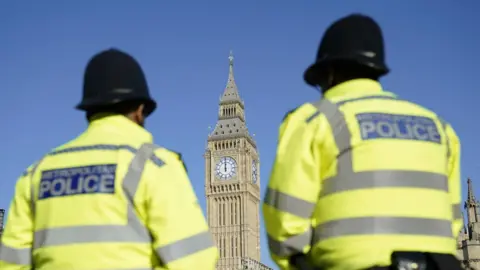 Andrew Matthews/PA Wire
Andrew Matthews/PA WireSpecialist rape and sexual offence investigation teams will be introduced to every police force in England and Wales by 2029, the government has pledged.
It is part of a long-delayed plan aimed at halving violence against women and girls within a decade.
The strategy - which will include funding for undercover units operating online, and a roll out of domestic abuse protection orders - is due to be unveiled on Thursday, after being pushed back three times this year.
Home Secretary Shabana Mahmood said the measures will help to "bear down on abusers, stopping them in their tracks. Rapists, sex offenders and abusers will have nowhere to hide."
The government says the new teams will have officers with specialist investigation skills for working on rape and sexual offence cases.
More than 50% of police forces already have these teams in place, but the government says every force will have dedicated officers by 2029.
It says staff will have the right training to understand the mindset of abusers and victims.
Announcing the move, the home secretary said: "This government has declared violence against women and girls a national emergency.
"For too long, these crimes have been considered a fact of life. That's not good enough. We will halve it in a decade."
Also announced is a roll out of domestic abuse protection orders, which have been trialled over the last year, across England and Wales.
They can ban individuals from contacting a victim, visiting their home or posting harmful content online, and can also be used in cases involving coercive or controlling behaviour. Breaching an order is a criminal offence.
There will also be almost £2m in investment for special undercover units of police officers operating online - to target those harassing women and girls on the internet.
A report released earlier this month found that more than a quarter of police forces in England and Wales had not implemented basic policies for investigating sexual offences.
It said sexually-motivated crimes against women in public remained widespread, criticised the limited nature of data on them, and called for urgent action to prevent predators from offending.
The publishing of the government's strategy has been long delayed. It was initially expected to be announced in the spring.
In Labour's general election manifesto last year the party pledged to use "every government tool available to target perpetrators and address the root causes of abuse and violence".
On Tuesday, the chairs of three Commons select committees raised their concerns over repeated delays in publishing the plans.
The BBC has previously been told that changing attitudes among boys and young men will be at the centre of what is proposed.
It is understood it will be built around three goals: preventing radicalisation of young men, stopping abusers, and supporting victims.
Some domestic abuse survivors have told the BBC the time for talking is over - and these measures must be implemented quickly.
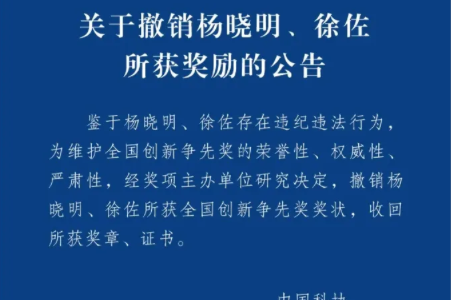
近日,中国科协发布《关于撤销杨晓明、徐佐所获奖励的公告》。

公告显示,鉴于杨晓明、徐佐存在违纪违法行为,为维护全国创新争先奖的荣誉性、权威性、严肃性,经奖项主办单位研究决定,撤销杨晓明、徐佐所获全国创新争先奖奖状,收回所获奖章、证书。
全国创新争先奖是仅次于国家最高科技奖的一个科技人才大奖,是国家科技奖项与国家重大人才计划的有效衔接,于2017年由中国科协联合人力资源社会保障部、科技部、国务院国资委报请中央批准共同设立。
杨晓明代表性发明专利:
一种SARS-CoV-2灭活疫苗及其制备方法
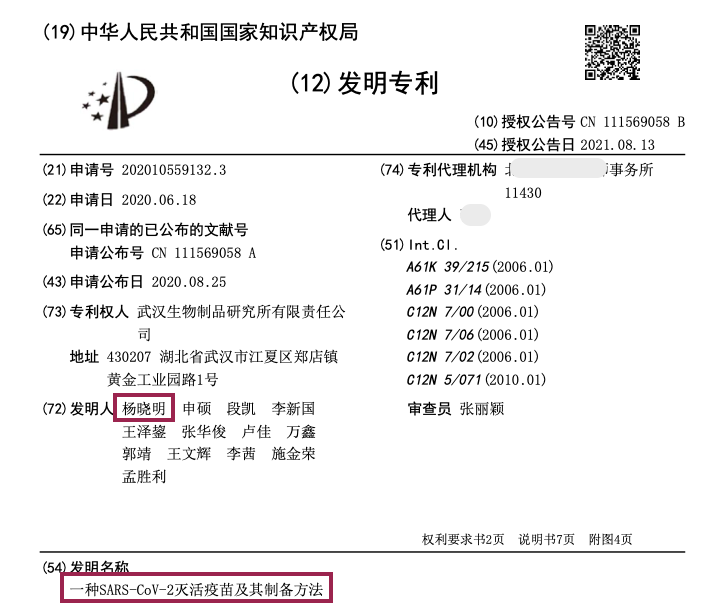
新型冠状病毒Vero细胞灭活疫苗病毒液的纯化方法:
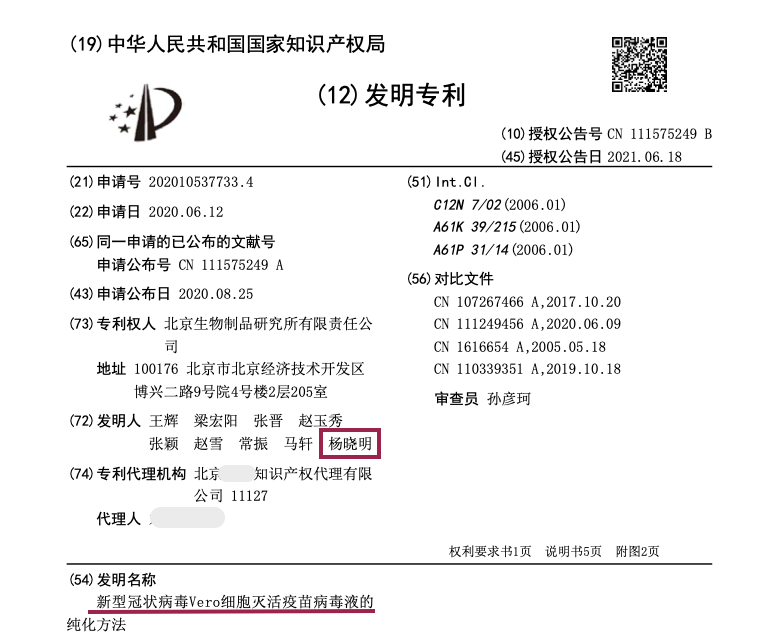
新型冠状病毒Vero细胞灭活疫苗病毒液及其生产方法:
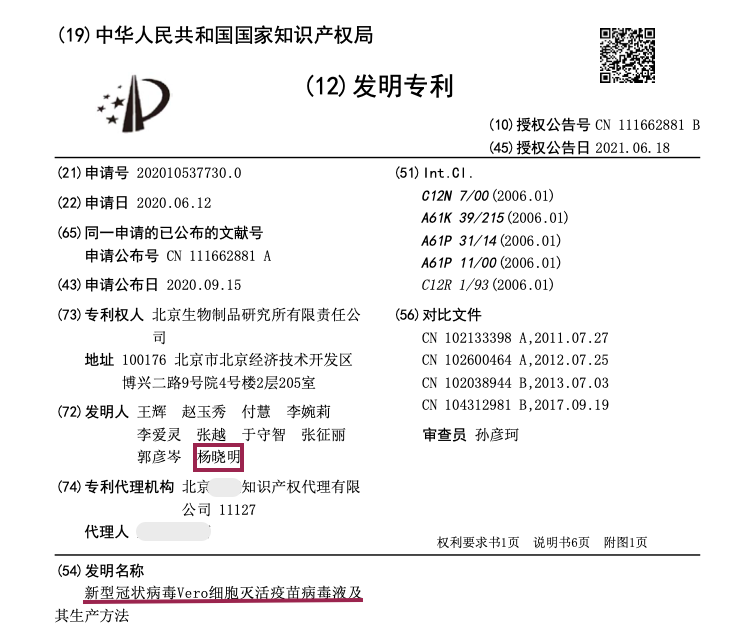
……
全国创新争先奖是继国家自然科学奖、国家技术发明奖、国家科学技术进步奖之后,我国批准设立的又一个重要科技奖项。它被视为仅次于国家最高科技奖的科技人才大奖,在学术圈内拥有崇高地位。
杨晓明曾被誉为“中国新冠疫苗之父”,曾任中国医药集团有限公司总工程师、首席科学家,中国生物技术股份有限公司首席科学家。在新冠疫情中,他带领团队成功研发上市全球首款新冠灭活疫苗。
说到疫苗,不得不提科兴生物。
曾在疫情期间凭借疫苗一年狂赚600亿元的科兴生物。
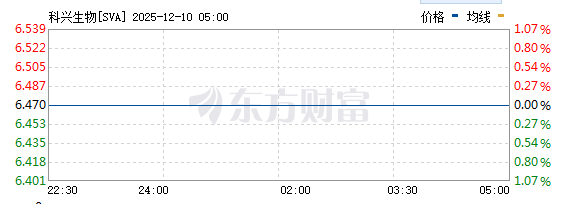
就在一个月前,纳斯达克正式向科兴生物发出退市决定书,定于2025年11月21日摘牌,虽然科兴已经提起申诉,但前途未卜。
截至2025年7月,科兴生物美股总市值3.9亿美元,现金储备高达103亿美元,就在7月,科兴生物宣布了一项总额74.48亿美元(约合人民币530亿元)的分红计划,这一异常情况引发市场广泛关注。
我们分到了三针,
他们分走了530亿~
因红楼梦发起的悼明运动在网络探讨热烈。翻看了一下,现在已经不仅仅是红楼梦了,就连《流星花园》,《三体》,甚至是《熊出没》啥的都是在致敬明朝。
看看上面这些半戏谑半认真的评论,不知道朋友们作何感想?
我个人,这场奇特的风潮其实没啥说的,几个观点:
一是,先说大背景。
在我没写的这一个星期,我基本没有上网,哪怕蹲在路边看几个小镇老年人下棋,在甘蔗地围观几个少年烤鸡,都是要比网络多了很多的趣味。
再说白了,现在的网络在视频切片,一句话切入的方式下,你越雷人越不尊重事实越可以引发探讨的流量盛宴下,什么《芳华》,到红楼的“悼明”只会是一个开始。
尤其是现在无聊的人越来越多,为了打发之间,排泄心内的抑郁之情,加上很多现实的东西你没有办法去说,那么网络只会愈发荒诞。
这是我个人的理解。就是一场风潮必然是有着时代的大背景。当然,我的理解不一定对。
二是,因为悼明,网络上发生了争吵,就是喜欢清朝宫廷的那波人和明朝那些事儿,或者说大明王朝的那部分死忠粉吵起来了。大明的死忠粉就会说一句没有满清的话现在只会更好,满清的则会说,明朝的腐朽才是历史灰暗的转折点。
这两波吵闹,吵到昏天暗地,看吵闹者们的架势大有着各自是王爷和格格的架势,都在为自己的“爸爸”说话。
但我想说的是,明朝也好,清朝也罢,民国之前的任何一个朝代,是汉族人也好,满清也罢,甚至说蒙古的大元朝又杀回来了,中国的近代一样会落后。
因为只要是封建,只要是王朝,只要是早朝例行朝拜,只要是这一家把另一家打下来想着的是自家的利益,皇位交给儿子,儿子交给孙子,中国的近代一样会落后。无论任何的人种只要是这个思维,在公西方工业革命如火如荼的变革下,一样会挨打,会被霸凌瓜分,奴役。
也就是说,不是满清的责任,不是明朝的没落,不是任何一个人种可以改变的,而是封建皇权的思维作祟,是人性的自私,人上人的这种思想导致的落后挨打。
也所以我不理解现在网络吵闹的这些人们,一边在吃着廉价的外卖,一边在打完一天的螺丝钉回到狭隘的出租屋吵个什么劲,因为事实是,你即便回到了明朝和满清,你的祖上连给皇宫挑粪的资格都没有。
就这么简单。
三是,在短剧的盛行下,在现实的困顿和虚幻的盛宴下,当下的人是很容易逃避现实的,这在心理学上也不复杂,因为人在面临痛苦的时候就是这样,即便逃避也要找个爽点来“滋养”自己,尤其是幻想一下舒爽的又不违法,而且还不得罪人。
那么就天天幻想自己也是个“王爷”。
但问题是郁达夫的“沉沦”不有这么一句话,你沉沦获得了短暂了逃避现实的书愉悦,但你终归有一天还会醒来,而醒来后是满身的疲倦。
这个疲倦和吸食鸦片有着一样的结果,昨天不还看一个人骂谁谁谁是全球最大的毒枭被人家起诉了,还赔了5万元钱,其实按照我个人的理解这就是在吸食毒品。
你看这些爽点,沉迷于幻想,但你总还是要面临现实扽生活,你总有一天还要醒来,尤其是当你醒来的时候因为这些幻想而将自己玩废了的话,那么就会更痛苦。
这个精神鸦片有点敏感,我也就此打住。
再啰嗦的话就是随着这场悼明的运动,什么天子守国门,君王死社稷又火起来了。因为这句话,又让很多的货感动到泪眼汪汪,大有着爹爹好伟大之类的行为特征出来。这个我看到很多老师都在驳斥了,之所以朱棣将皇城从南京迁到北京其原因是得位不正,而他的班底在北京,就像你的公司核心人员在北京,核心人员的事业营生都在北京,那自然会想法让老板也回到北京,也所以,天子守国门就这么简单。
至于君王死社稷,崇祯死了,再说白了,崇祯不该死吗?一个基本的事实是,中国人的性格是什么时候会反?那就是实在活不下去的时候。看看明朝的末年,老百姓易子而食,吃观音土,吃到树皮都没有吃的时候是实在活不下去了,才有了李自成这样的人物出现,再说白了崇祯是被李自成的义军打到了皇城下面才不得不自杀的。这样一个昏庸,把民生搞的生灵涂炭的家伙,仅仅是因为被逼死了,现在成了“君王死社稷”。
当然,这也不能怪那些此时此刻为这句话感动到落泪的脑残们,就像昨天我所说的,他们喜欢看爽文,只要人家写的爽了,那么事实不事实,有无逻辑都不重要了。
对了,任何东西都是有因果的,看见没有,发明“天子守国门,君王死社稷”的这货,现在不也残了,据说精神分裂。
谢谢!
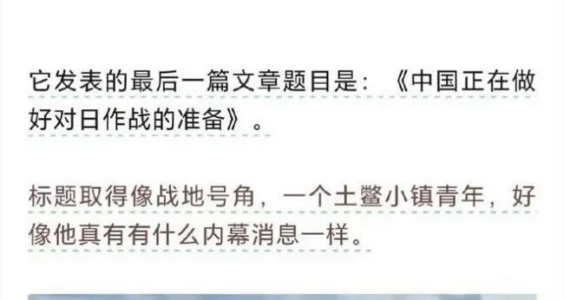
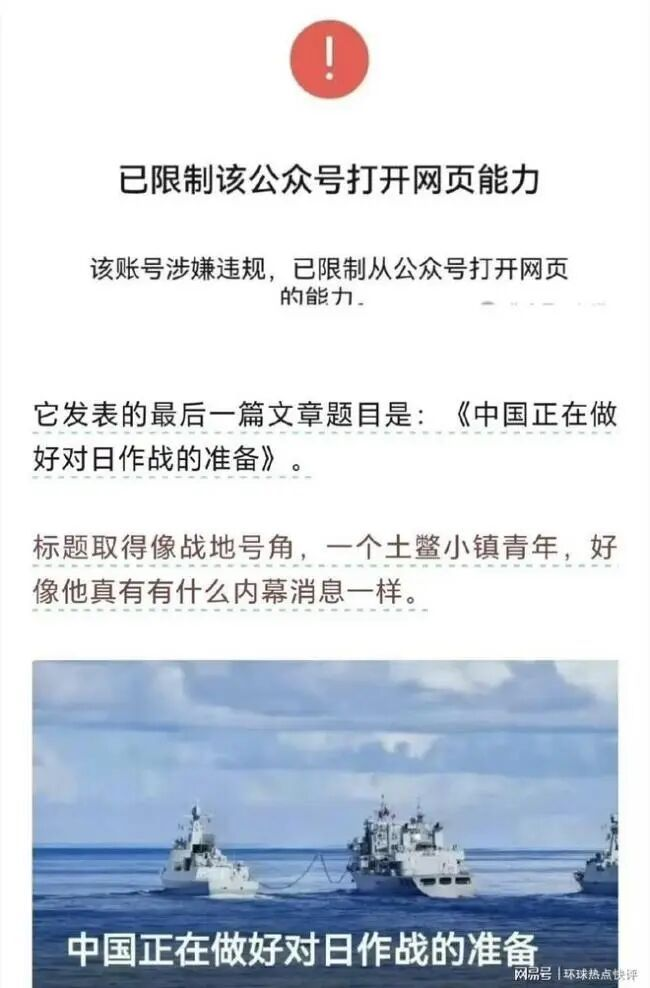
“爱国大V”卢克文又被封杀了,颇为轰动。微信群里转来一篇公号文《卢克文工作室被封:一个“地摊战略家”的破产》,鞭辟入里、入木三分,值得一读。
文中提了一个很有意思的问题:“这样一个预测不准、事实常错、价值观时常跑偏的自媒体,凭什么坐拥三千万粉丝?”。
作者自问自答道:“答案藏在中国的县城网吧和工厂宿舍里。当北上广的白领在星巴克讨论地缘政治结构时,小镇青年们正在流水线休息间隙,刷着卢克文揭秘世界真相的短视频”。
这就有点想当然了。
“地摊战略家”的市场也是分层的。最次一档的当属“地铁老爷爷专供”的大字号,公园晨练的谈资、铁腚旅游漫漫旅途打发时间。老登圈之外,是没人看的。最高一档登堂入室,笑容如菊花般灿烂的金灿荣老师之流,都是“登堂入室”的高端局——“堂”是大学课堂,“室”是企事业机关的会议室。“走穴”讲座十几万元一场,往来无白丁。
卢克文的市场定位比上不足,比下有余。去年12月,卢克文在某平台推出《人生进阶课》,定价199元、以“知足经济学”为卖点,鸡汤味十足的中年定制。斩获50万订阅,喜提年度第一。无论是主题,还是定价,都不是以“县城网吧”和“工厂宿舍”为目标的。
卢克文也尝试过下沉市场,2022年8月在抖音直播带货首秀,一小时只卖了600块钱,成了江湖笑谈。
这也不难理解。卢克文是动辄大千、上万的鸿篇巨制,并不适合“县城网吧”和“工厂宿舍”。下沉市场用户完读三千字都费劲,更受用司马夹头的咆哮式演出,主打一个情绪价值拉满,倒也不看重卢克文东拼西凑、虚头巴脑堆砌起来的“知识增量”。
其实,“北上广的白领在星巴克讨论地缘政治结构”也就那么回事,核心逻辑和价值取向和“茶馆大爷”、“县城网吧”、“工厂宿舍”并没有什么区别。长期反美、定期反日,“赢学”和“大棋”齐飞,酒过三巡必有“中美必有一战”、“中日必有一战”的气冲斗牛。只不过,这些“高端局”的“必有一战”,要配上盎撒集团、犹太集团、共济会的前戏。卢克文们的卖点,就是这套前戏。
卢克文神神叨叨的千字长文煞有介事,既能维系“未庄共识”的抱团意识,又满足赵老爷们了“阿Q不懂”的阶层优越感。成功岂是偶然?
我们的知识分子试图回避一个问题,“未庄共识”是跨越阶层的。高学历的赵老爷和文盲阿Q,并没有见识上的差别。学历不等于知识,知识不等于见识。学历的知识含量,取决于学校教什么。知识能不能转化为见识,取决于思考的勇气。我们有吗?
绝大部分国人一生经历两个阶段,学生时代是“学而不思则罔”,步入社会后是“思而不学则殆”。前半生是教科书怎么教就怎么学,不敢越雷池半步;后半生啥也不学,热衷瞎琢磨。所以,甭管学历多高,都是无差别的“原厂配置”用到死。985毕业的高材生和初中辍学的打工者的见识,出奇的一致。引用福山和亨廷顿的,大半也是“六经注我”。
牢不可破的“未庄共识”,为“地摊战略家”提供了庞大的市场空间。只要把“原厂配置”玩出花样,垂直细分必有一席之地。这行的成功关键,取决于“旧瓶装新酒”的勇气。因为,“旧瓶”很脏,但管用啊。
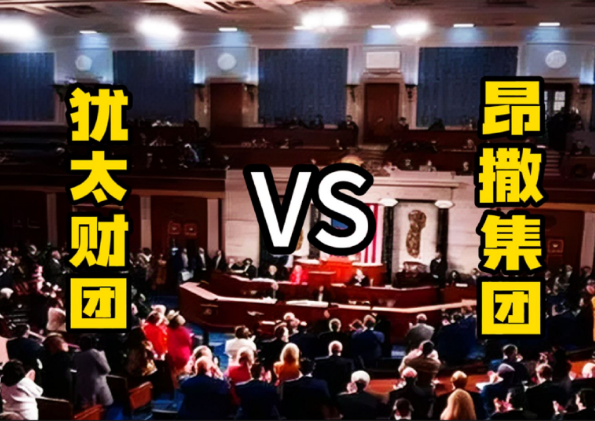
比如说,许多精英人士挂在嘴边的“盎撒集团”就是从日本军国主义意识形态里抄来的,用在反西方正好。卢克文一战成名的反犹主义,则是纳粹种族主义的正统传承。分析方法更好办,直接从明清演义小说汲取灵感。三国演义、东周列国志、三十六计上全套。至于价值观,十九世纪的抢钱抢地抢资源足够了。
所有的“地摊战略家”都是这套,区别无非是见人下菜的表达技巧。抢钱抢地抢资源,对阿Q就是“拳头是硬道理”的简单直白。对赵老爷,就得文绉绉的“真理只在大炮射程之内”,还得假托俾斯麦凸显逼格。反正举人老爷高中后也不读书,不怕穿帮。
“地摊战略家”和一些所谓的“庙堂战略家”的区别,也只是差了一件袈裟罢了。有袈裟的是大唐御弟圣僧,登堂入室;没袈裟的金池长老,占山为王。
“生态位”不同,念的都是同一本经。卢克文敢偷师纳粹,“地摊转正”的某大报也有戈培尔名言做标题的壮举。卢克文虚构事实,某主编也曾“巴格达保卫战”一战成名。“预测不准、事实常错、价值观时常跑偏”不是卢克文的专利……
所以,封了卢克文又如何?未庄还是未庄,未庄不缺下一个卢克文。因为,我们的中产精英需要“地摊战略家”满足他们自我毁灭的强烈欲望。
享受和平红利,却不珍惜和平;在全球化时代崛起,却要追求举世为敌的“霸气”。识不配位,消亡在即,多一个卢克文少一个卢克文,并不能改变什么。
中国国家发改委部署明年重点任务,其中包括适应人口形势变化优化公共资源配置。
据中新社报道,全国发展和改革工作会议星期五(12月12日)至星期六(12月13日)在北京召开。
会议明确了九项明年发展改革重点工作,分别是:编制实施好“十五五”规划;多措并举促进投资止跌回稳;提振消费要出实招出新招;综合整治“内卷式”竞争和培育发展新动能;进一步全面深化改革;深入扩大高水平对外开放;以双碳为引领加快推进全面绿色转型;更大力度保障就业和改善民生;适应人口形势变化优化公共资源配置。
其中,针对稳投资,会议提出,充分发挥“两重”建设(国家重大战略实施和重点领域安全能力建设)、新增地方政府专项债券等各类政府投资资金作用,适当增加中央预算内投资规模,继续发挥新型政策性金融工具作用,不断提高投资效益。面向“十五五”谋划实施重大工程项目。进一步明确投资规则,扎实做好前期工作,加强投资项目调度。深入实施促进民间投资发展的若干措施,有效激发民间投资活力。
在改革工作方面,会议提出,研究制定全国统一大市场建设条例,协同推进“准入、场景、要素”一体化改革;持续抓好招商引资、招标投标等方面重点问题整治,坚决破除各类壁垒障碍;更大力度发展民营经济,大力推动民营经济促进法配套制度建设。
围绕前述重点工作,会议还提出,完善重点行业产能治理和重大基础设施调控;优化实施消费品以旧换新政策,积极扩大服务消费;稳步实施碳排放总量和强度双控制度,完善配套制度,强化评价考核,严控新增“两高”项目等。
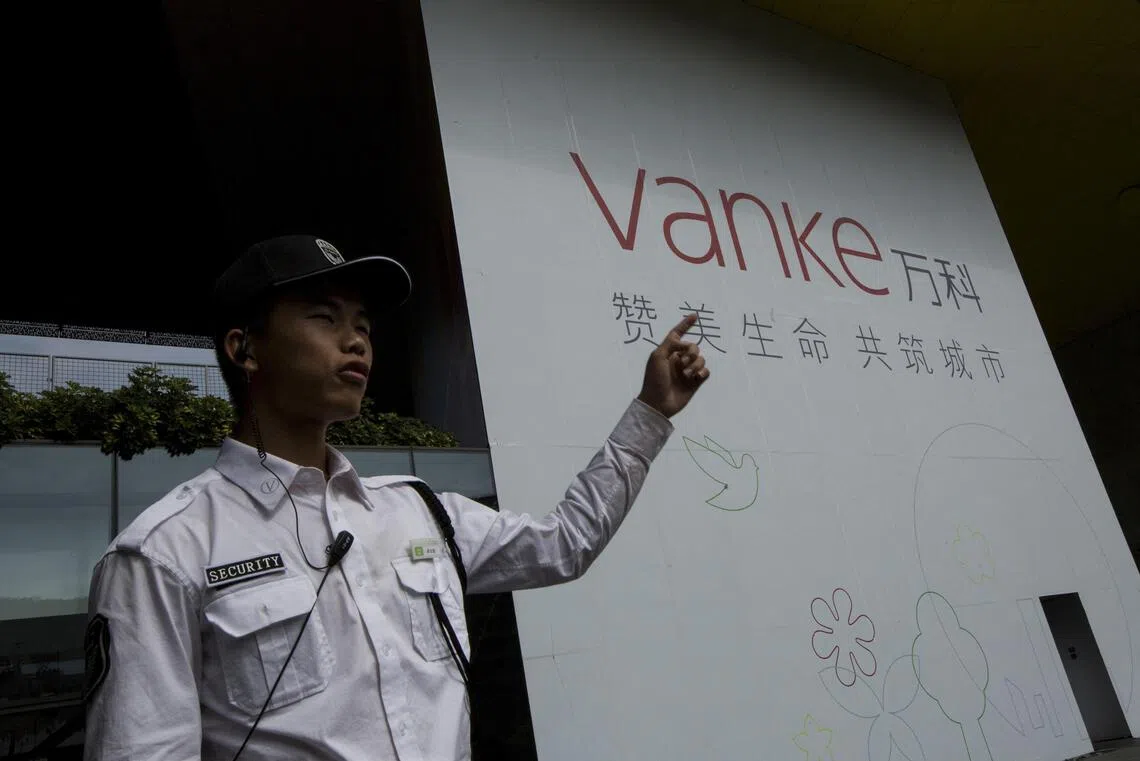
中国房企巨头万科星期一(12月15日)到期境内债券的展期议案未能获得足够债券持有人的支持,违约风险加剧。
据彭博社报道,该议案以及另外两项议案本可让资金紧张的万科将20亿元人民币(3.64亿新元)债券的偿付延迟一年。
万科最初提出的方案 —— 即本息展期12个月,没有任何前期支付或分期付款 —— 未获得任何债券持有人的投票支持。随后公布的另外两项议案要求万科采取增信措施并按时支付利息,分别获得了持有债券未偿还金额83.4%和18.95%的持有人的支持。
根据中国银行间市场交易商协会网站刊发的公告,所有三项议案均未达到通过所需的至少90%的支持率门槛。
彭博社的报道称,为债券展期计划赢得支持是万科缓解流动性压力的关键一环。若无展期协议,且如果到周一无法完成全额兑付,万科面临即刻的违约风险,尽管根据该债券的募集说明书,公司仍有五个工作日的宽限期。
万科是中国为数不多在长达数年的楼市低迷中尚未倒下的大型开发商,但市场观察人士警告称,万科日益恶化的问题可能拖累中国经济,并可能加剧房地产行业的衰退。
万科的债务危机在最近几周进一步加剧,最大国有股东、已向万科提供了超过300亿元人民币股东贷款的深圳市地铁集团收紧了融资条件。此举暗示深铁对万科支持策略的转变,导致万科证券大幅下跌。

© Alex Welsh for The New York Times
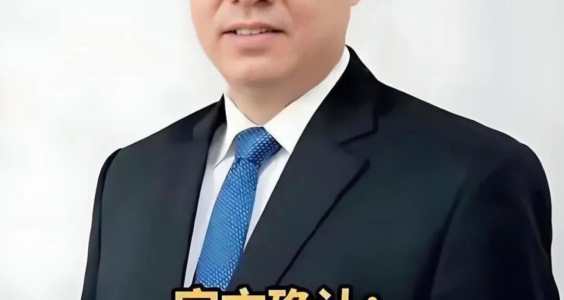

我们曾将性命相托的疫苗,其掌舵者竟可能不清白?
这是一则被严重低估的新闻。
今年11月28日,一纸公告落下。中国科协宣布,撤销杨晓明所获全国创新争先奖奖章、证书。这奖颁了没几年,收回去的速度,委实太快了些。
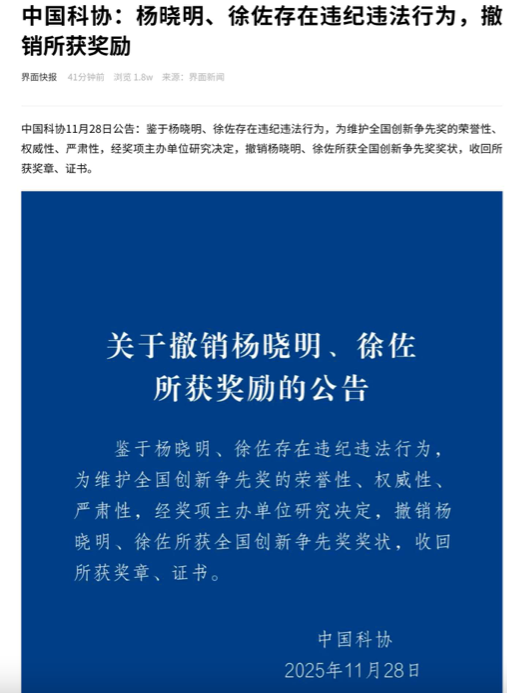
奖章被装进盒子,证书被收回档案室。仪式无声,却比任何审判都响亮。
那个曾经站在人民大会堂、世卫组织讲台、央视镜头前的“疫苗英雄”,此刻在纪律审查的文件里,成了一个被标注“涉嫌严重违纪违法”的名字。
一年多前,2024年4月23日,杨晓明因涉嫌严重违纪违法,被罢免了第十四届全国人民代表大会代表职务。
他的犯罪背后有着怎样的秘密?
时间往回倒带,倒到一九六二年二月,甘肃舟曲。
一个藏族男孩出生,他后来沿着一条标准的精英路径前行:西北民族学院预科、兰州医学院、兰州生物制品研究所。然后,是令人眼花缭乱的国际履历:日本国立预防卫生研究院、美国FDA、美国NIH。这些字母缩写,是他学术护照上最闪亮的签证。
回国后,他成了“救火队长”和“掌门人”。从兰州到武汉,再到北京;从研究所所长,到国药集团总工程师,再到中国生物董事长。
他手里握着疫苗的“兵符”——脊髓灰质炎、百日咳、轮状病毒……最后,是那个改变世界也改变他命运的新冠病毒。
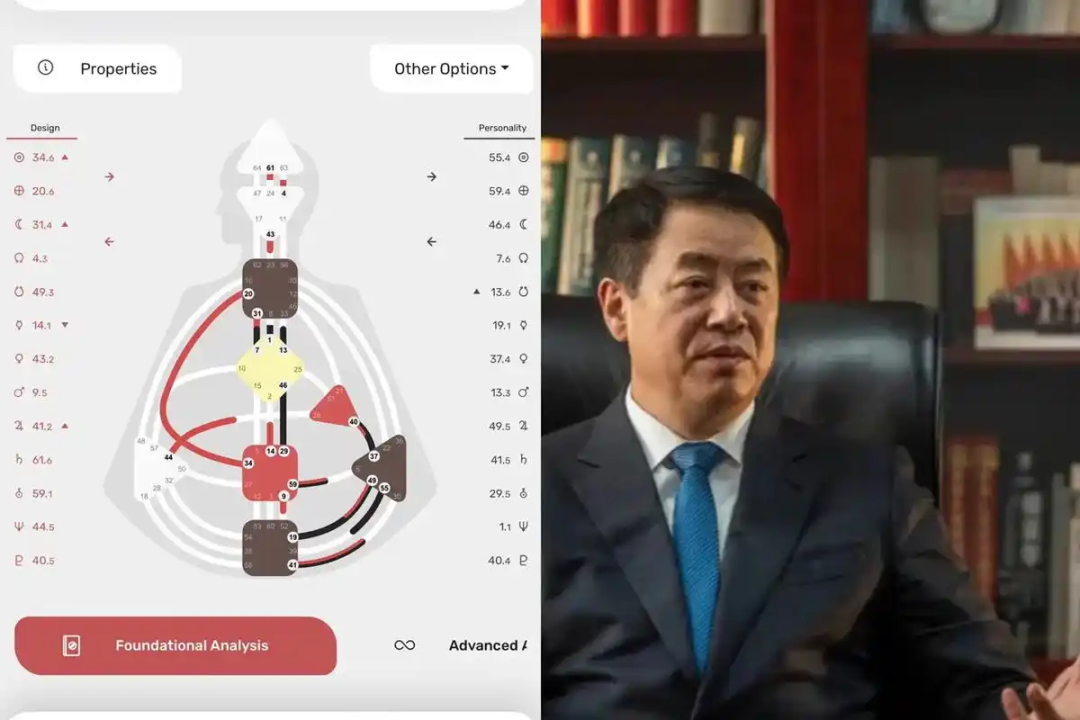
新冠三年,是杨晓明人生的“高光时刻”,也是“聚光灯时刻”。
他带领团队,宣称用三百三十五天的“中国速度”将灭活疫苗推向世界,成为首个被世卫组织批准的发展中国家Yi苗。
那段时间,他频繁出现在新闻里,白大褂,坚定的眼神,讲述着“科技抗疫”的故事。他成了中国工程院院士有效候选人,成了中国医学科学院学部委员,成了“为抗击新G肺炎Yi情、保障人民生命健康做出重大贡献”的标杆。
然后,聚光灯骤然变色。
2024年3月,西藏自治区人大常委会罢免了杨晓明全国人大代表职务;
四月,全国人大常委会公告其代表资格终止。
理由是那九个字:涉嫌严重违纪违法。
具体何事?公告未详述。但民众盯着他那几个头衔:中国医药集团有限公司原总工程师、首席科学家。医药、疫苗、首席科学家、违法违纪——这几个词放在一起,足以在舆论场引爆一场无声的海啸。
人们开始回溯。回溯他在疫情期间的每一次亮相,每一句承诺;回溯中国生物yi苗的快速审批与全球使用;回溯那些关于YI苗有效性、安全性与公平分配的争议……
疑问像野草一样生长:那些“全球首个”“重大贡献”的光环下,是否藏着利益的藤蔓?在性命攸关的Y苗研发与审批链条上,这位“总工程师”的手,究竟触碰了科学与良知的边界,还是越过了纪律与法律的红线?
舆情背后,是几种复杂的民众期待在翻滚。
其一,是对“专家”祛魅后的愤怒与幻灭。
疫情将科学家、医生推上神坛,公众期待他们是纯粹的、超然的救世主。而当光环人物从“国士”沦为“嫌犯”,这种坠落感引发的不仅是失望,更有被背叛的怒意。
我们曾将性命相托的Y苗,其掌舵者竟可能不清白?
其二,是对医药领域“深水区”腐败的深层次担忧。
药价虚高、采购黑幕、审批寻租……这些沉疴痼疾,是否已侵蚀到Yi苗这一最应纯洁的“生命防线”?
杨晓明案像一根探针,刺痛了公众对医疗健康领域公平正义最敏感的神经。
其三,是一种更为理性的期待:期待真相,期待程序正义。
舆情并非一味“猎巫”,公众要的,不仅是一个人的倒下,更是一个领域的清朗,是一套能防止“下一个杨晓明”的透明机制。
杨晓明的人生剧本,从甘肃小镇写到世界舞台,再从荣誉之巅跌入审查漩涡,充满了时代隐喻。
他曾是“知识改变命运”的样本,是“科技报国”的象征,最终却可能成为“权力腐蚀专业”的注脚。
他研制的Yi苗,注入亿万人臂膀,抵御了一种病毒;而他涉嫌的“违纪违法”,则如另一种病毒,侵蚀着公众对科学权威与制度保障的信任。
杨晓明案,留给时代一剂最沉重的“反思针”。
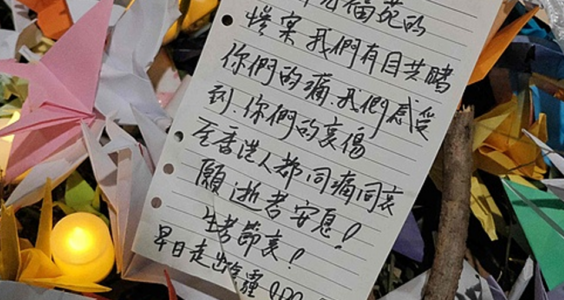
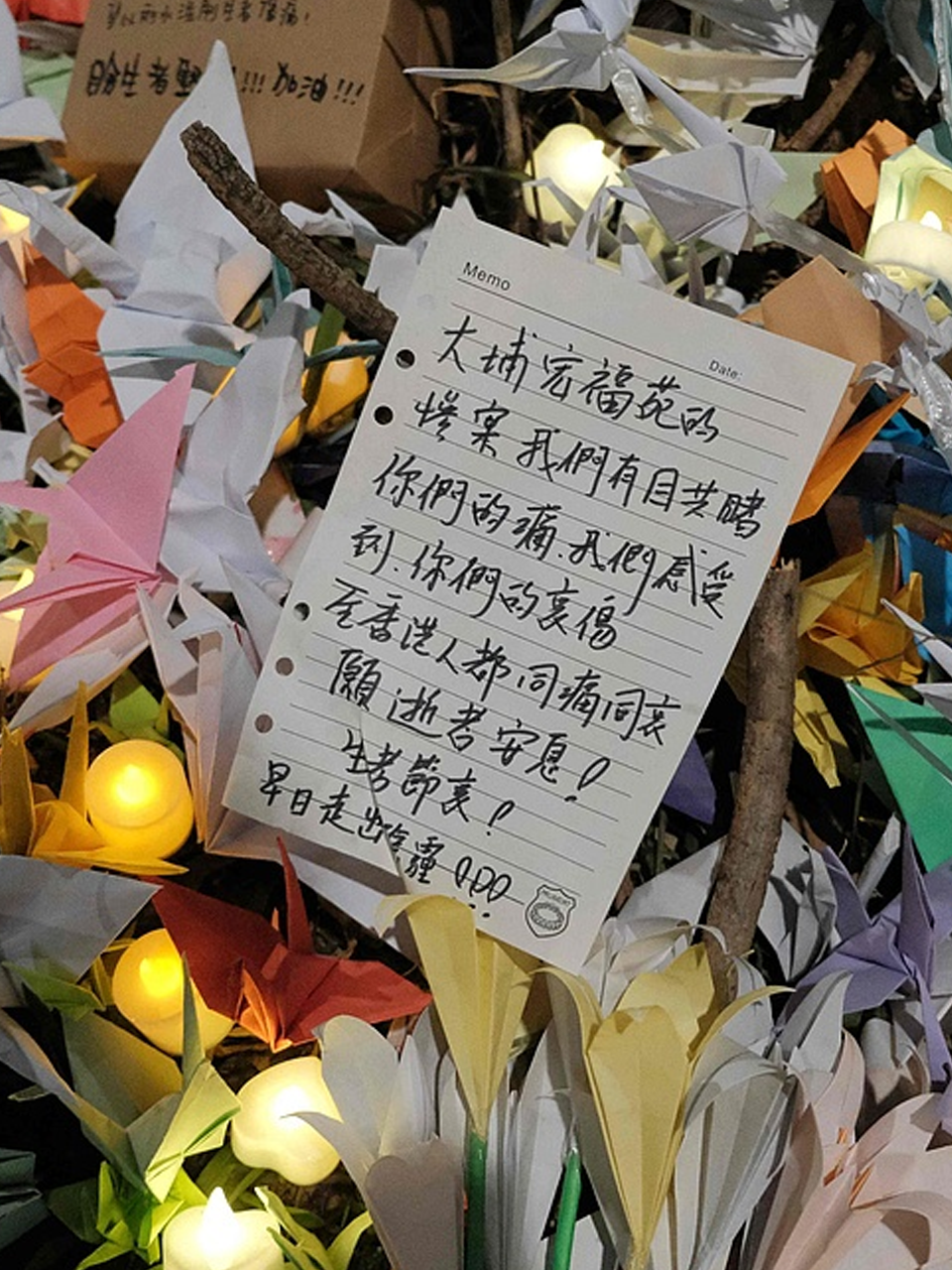
Tracy的公公最后在家中厕所遇难,他手里紧握身份证,身上裹着两张打湿的棉被。这个场景是家属认领遗体照片时目睹的,公公身体不好,长期依靠呼吸机与轮椅生活,Tracy特别想称赞他好聪明,“可以想象,他当时是平静面对死亡,手里握着身份证,害怕家人找不到他。”
香港大火已经过去整整两周,根据最新统计数字,这场史无前例的、七栋高楼同时着火的灾难造成160人遇难,其中最年长者97岁,最年幼的是1岁的婴儿。
大火已被扑灭,但漫长的哀伤才刚刚开始。香港的社会服务机构在火灾后立刻行动,为灾民提供免费的心理支援和殡葬支持,我们联系了十家机构,很多社工仍在随时待命,全力支援失去亲人的家属,难以抽出时间,也有社工因临时接到任务,取消了交谈,最终五名社工在工作间隙跟我们进行了交流。
12月5日,我在zoom会议中见到了香港圣公会福利协会安宁服务总监陈慕宁,她和社工团队正在支援遇难者家庭,这是她连续工作的第十二天,她需要直面很多老人孩子的死亡和家属的悲伤,同时要隐藏起自己的感受,偶尔工作结束后回到家,她还会默默流泪,“生命的突然离去,实际触动了我们每一个人。”
陈慕宁和社工同事驻守在大埔的社区会堂,提供免费的情绪支援,并陪伴有需要的家属完成遗体认领过程,“我们其实是想减轻整个家庭在这件事中的冲击。”她告诉我,对于家属来说,认领遗体是最艰难的一步。
火灾发生几天后,遇难者的遗体陆续被转移到了公众殓房,各个社区会堂先开放供家属以照片辨认遗体。家属们排成长队进入会堂,完成手续走出门后,紧紧抱住彼此痛哭。一些家属身旁有两名社工陪伴,他们不适应媒体镜头,社工有时会抱住家属,举起衣服遮住家属的脸。
2025年12月3日,香港大埔区宏福苑发生致命性火灾后,居民返回家中收拾物品。
辨认遗体前,有一到两名社工会事先与遇难者家属沟通,了解家庭构成和家属的心理承受能力。有的老人家和病患成员可能不适合参与整个过程,社工会建议家属选出几个代表来完成程序,减轻对其他家庭成员造成的心理冲击。
认领遗体照片前,陈慕宁团队的社工会向家属收集遇难者的特征、身穿衣服、最后身处的位置、身上佩戴的首饰等,再与警方沟通。这些线索有助于警方及法医筛选遗体的相片供家属辨认,他们会尽量避免家属看到不必要、不对应或者过度冲击的照片,极力减少家属会遭遇的创伤。
看完照片后,家属会前往富山殓房的公共停灵处进一步确认,这是香港最大的公众殓房,有一万八千多平米。社工们会先与法医沟通协调,事先了解遗体大致状况,再提供“预告”——为家属简单描述遗体状况,让家属有心理缓冲、做好心理准备。
陈慕宁说,因为随着时间推移,遗体的状态会发生变化,当家属真正见到遗体时,情绪往往剧烈波动,会更加迷惘、彷徨、无措。最终家属可能确认出是亲人的遗体,也可能认不出来,“照片似乎是,但实际遗体却不是。”
若遗体无法辨认,就需要进行 DNA 比对。整个流程会因此延长四到六个月。漫长的等待会让这些家属特别无力、煎熬。“他们尚未成为丧亲者,但也预料自己随时可能接到死亡的消息。”陈慕宁说,社工会持续跟进这些家庭,帮助他们进行心理建设。
火灾后,慈善殡仪机构“毋忘爱”的创始人范宁遇到了几位迟迟不愿认领遗体的家属——他们当时还无法承受残酷的事实。
范宁是一位外科医生,参与过汶川地震和新冠疫情的丧亲者支援,经验丰富。他告诉我,每个人的哀伤反应都不同,家属不是故意逃避,而是情绪尚未抵达那个位置,“一定要允许他们按照自己的节奏去处理,而不是用行政手段逼他们、push他们完成程序。”
同时他也提到,安排葬礼的重点也不在“尽快推进”,如果因推进太快、未能满足家属的真实需求,他们日后往往会感到后悔、遗憾,甚至怀疑自己在亲人的身后事上做了错误决定,这反而会带来二次创伤。
截止12月9日,仍有6人失联。警务处伤亡查询中心主管曾淑贤此前告诉媒体,“因为有些遗体已经烧成灰烬,所以我们不排除,最后未必能够将所有失联人士从(火场中)带出来。”说这句话时,她声音哽咽,忍住眼泪后又说了一句,“sorry”。
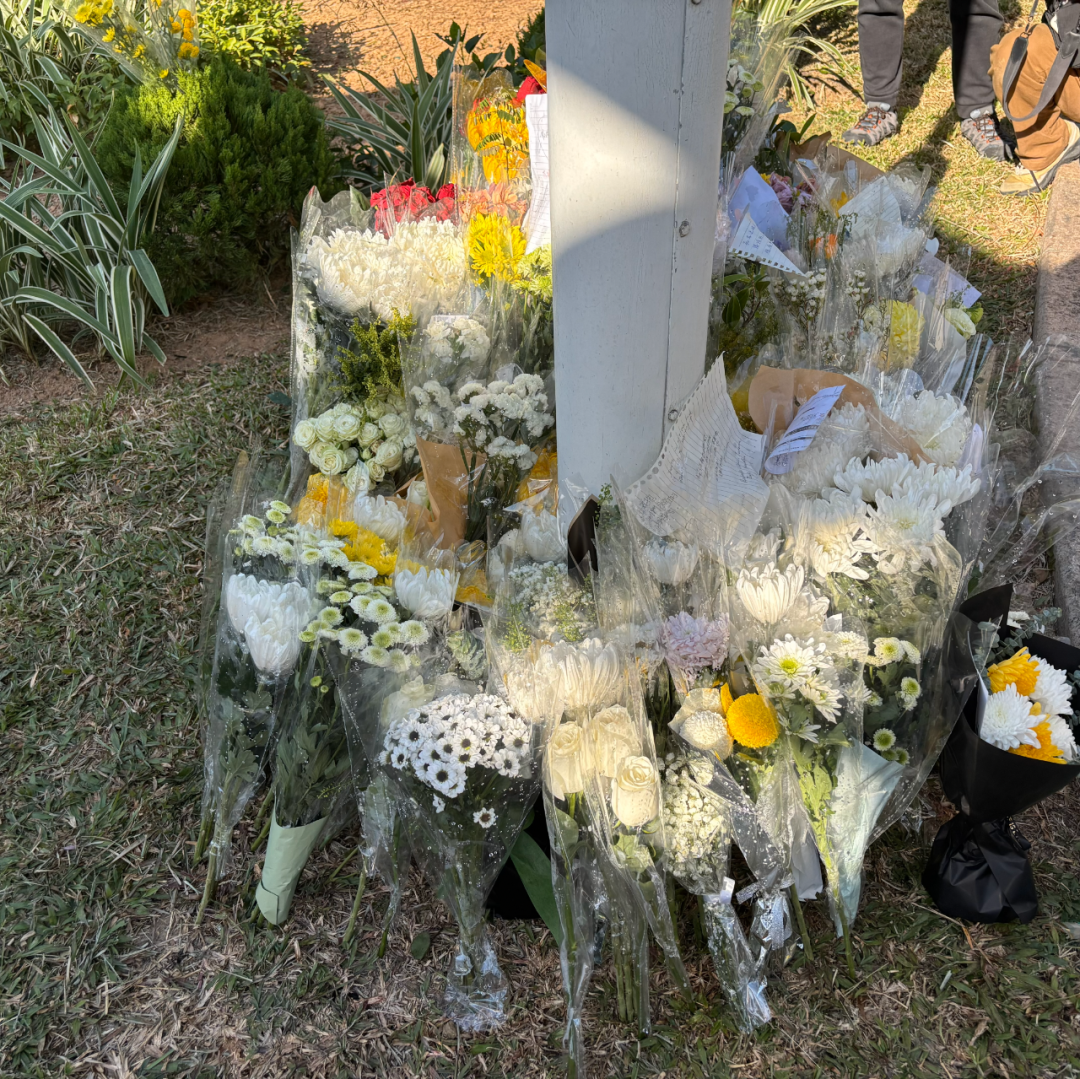
香港市民献花悼念
香港生死学协会总监梁梓敦,有接近20年的安宁服务社工经验。他告诉我,亲人失联的家庭是此次火灾中最需要支援的人群之一。因为在丧亲者支援中,关键的第一步就是让家属确认和接受死者去世的事实,哀伤才会真正开始流动、显现。而当没有遗体时,家属会产生“模糊性丧失”(ambiguous loss),这种丧失更复杂,也更难处理——“从客观上你知道他们大概已遇难,但主观上却会不愿承认。家属会陷入一种非常矛盾纠结的状态:我到底要不要相信他们已经去世了?”
让家属获得一个有仪式感、有意义的告别,是修复灾后创伤的重要部分。有些遇难者家属在与社工交流的过程中,提出了一个并未被预料到的需求——他们不希望亲人的遗体经历火葬。
陈慕宁解释,许多遇难者遗体都有烧伤,部分家属不希望亲人再次经历类似的痛苦,想要寻求土葬的方式安葬死者。虽然土葬在香港并非主流的殡葬方式,但社工们会尽力协调资源,帮助妥善安排。
一位年轻人在火灾中不幸丧生,他的家人第一时间询问圣公会的社工能否举办日本文化的葬礼,因为年轻人生前喜欢看日本漫画、听日本歌曲,家里还摆满了动漫公仔。社工回复,可以根据年轻人的兴趣与生活习惯举办个性化葬礼,家人听后感到宽慰,陈慕宁说,“他们最后还能花一些心思、按照逝者的喜好,好好送别他。”
香港劳工及福利局局长孙玉菡接受采访时提到,有235名外籍佣工在大埔宏福苑工作,94人来自菲律宾、141人来自印尼。根据最新数字,至少10名外籍佣工在火灾中去世。对于这些工人,陈慕宁说,“即使她们是外籍,家人在外地,我们也希望能够让家人庄重地接她们回家。”
对于那些没见到亲人遗体的家庭,梁梓敦设想了一些告别方式——可以将逝者的照片、生前使用过的物品和衣服放进棺木里,形成一个“衣冠冢”,同时邀请家属写下纪念文字。
人们需要道别,但有时候来不及道别。12月9日,曾淑贤告诉媒体,“我们收到查询,一位 90 岁婆婆在找一位 100 岁的婆婆,是她住在宏福苑的朋友。我们查询了资料,这位婆婆在 11 年前已经去世了。”
一名香港女士在家中听到了这个故事,她在社交媒体上感慨,“这样一段不需修辞的陈述,直击心灵。”她想起了李香琴旁白、关淑怡主唱的《三千年后》中的那段念白:
“再见,不要怪我第一句就跟你说再见,因为我真的是专程来向你道别。我不会说,我老了,我只会说,我在这里太久了。时间久了,难免知道人总会慢慢把过去淡忘,也会看着一些东西无声无息地消失。”
“毋忘爱”总干事Grace最初在支援过程中,会碰到那种异常冷静的遇难者家庭。
有一名先生,本来拥有幸福的四口之家,太太和两个小朋友都在大火中不幸遇难,独剩下他自己。最初,他要处理家人的身后事,面对各种文件、账单、琐碎的工作,他表现得格外平静,也许是没有时间和空间去回忆、纪念、流泪。
另一对夫妻的孩子和家政工人一起遇难。他们表面看起来并不像刚刚经历过大的灾难,每天都会翻出手机里孩子的照片,一张张给社工展示,一边绘声绘色地讲述,“孩子很乖的”,“最后一起吃饭,他那天很开心。”
在Grace看来,这种冷静并不意味着没有悲伤,更可能是情绪被压抑到最深处——“那些能够表达哀伤、说出自己感受的当事人,相对会比较容易支持他们。而需要投入更多关怀和照料的,是那些不愿表达、拒绝承认的人。”
在现场支援时,社工们做的最多的工作,就是在一旁陪伴家属——想看照片,就陪着看;想讲,就默默地倾听;想静静地坐着,就陪同沉默。社工往往不急着说很多话,而是给他们一个拥抱,那种在一起的感觉,比任何言语都更能让人感到不孤单。
在宏福苑住宅区附近悼念悼念现场,痛哭的女士。©视觉中国
悲伤之余,社工们还观察到,火灾过后最普遍的情绪之一是愧疚。火灾当天,一位先生接到长辈最后打来的求助电话,长辈年迈、行动不便,他告诉对方,“先找地方避一避,消防员和救护车很快就会到。”但后来火势太猛,长辈没能等到救援的到来。很多丧亲者之后会不断想起和家人的最后一次对话,也会愧疚,为什么未能将家人带离火灾现场。
Tracy的丈夫也自责没有让父亲带上呼吸机逃生,她的婆婆则自责没有在老伴身旁陪伴,两人携手生活四十多年,非常恩爱,她突然失去伴侣难以接受。Tracy丈夫的现实压力更大,他要假装坚强冷静,照顾家中老小的情绪,还要在毫无经验的情况下处理身后事和各种paperwork。
幸存者李先生也在媒体镜头面前,多次表达自己的内疚。被困在家中等待救援时,他听到门外有呼救声,于是弄湿毛巾捂住口鼻,冲了出去,最后他成功把邻居老夫妇救回家中,三人当时已经非常接近火源。
这对夫妇告诉他,他们听到一位印尼家政工姐姐,在走廊喊婆婆。李先生想再出去找她们,但屋外一片漆黑,无法分辨方向,他也再听不到呼救声。
最终,李先生和老夫妇在下午五点左右获救,一个小时后,那位婆婆和家政工一同遇难了。他说,“(工人)姐姐没有丢下婆婆离开,她很勇敢。”
李先生获救后收到很多称赞,“不仅救了自己,还救了两个人,你很厉害,你是英雄。”但每当听到这些话时,他都很心痛,陷入一种深深的自责,“感觉有两条人命在我面前,没有把握好我们就走了……我没有再开门出去尝试找找,如果逃出去之前我能找到,她们不会在六点死亡。”
这位遇难婆婆的女儿知道李先生的遭遇后,通过媒体转告他,“谢谢你,让我知道在最后时刻有人在我母亲身边,你已经尽力了,不要内疚。这一路很漫长,我很感谢有朋友一起哭泣。”
社工们还不得不面对更多激烈的情绪。一些老人失去了孙子、孙女,完全不能接受,会愤怒地控诉:“我平时求神拜佛,为什么没有保佑我们?”有人悲痛地说,“我不想做人了!”也有人因为至亲离世出现放弃生命的念头,面对这种情况,社工会和临床心理专家一起介入,进行危机干预,并长期提供心理支援和创伤治疗。
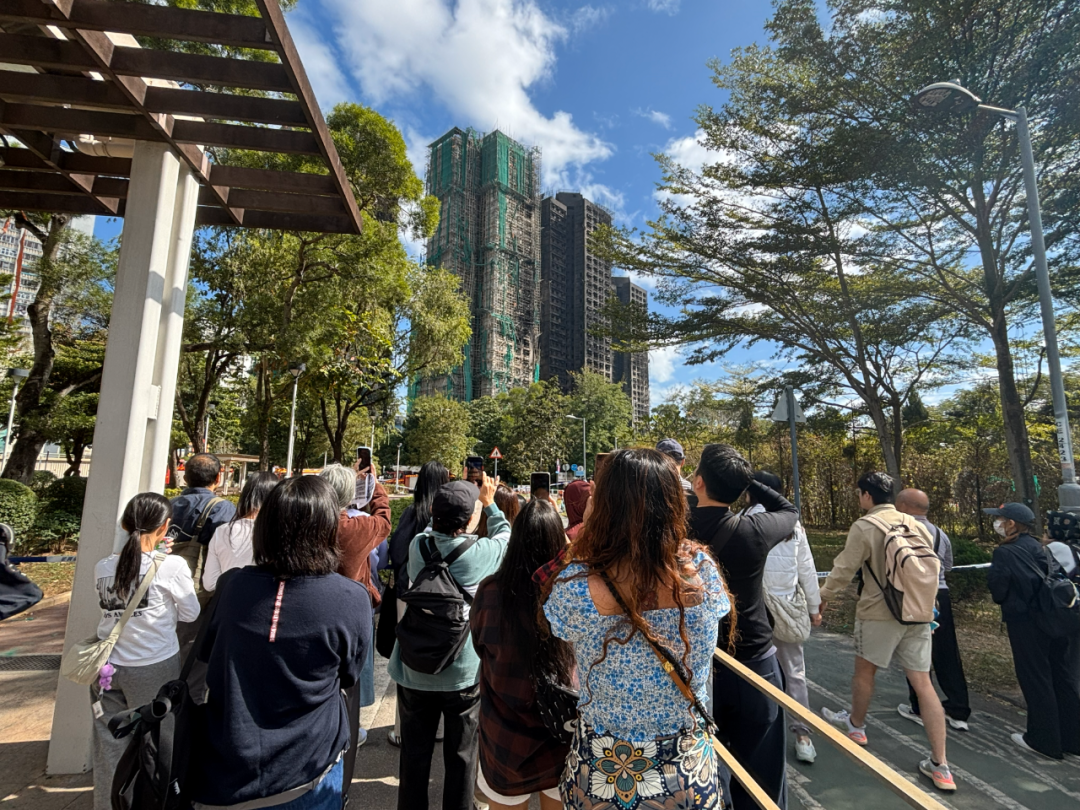
被烧黑的宏福苑大楼前的市民
范宁告诉我,愤怒是哀伤的一个必经阶段,尤其当这场火不是天灾,而是人祸。当家属骂人、不满、情绪激动,讲一些旁人难接的话时,都有原因。因为他们的内心处于极度的焦急和痛苦中,他们得不到答案,正确的支持方式是——“我们要容许愤怒、不接受的情绪存在,给他们一个安全的空间,让情绪发泄出来,而不是否定这种情绪。”
但在这一阶段,“毋忘爱”的社工们不会尝试解释事故原因,也不会引导和帮助家属“寻找真相”。一是因为他们不是专业调查人员,二是范宁认为,“即便日后有调查结果,家属也不一定能接受。可能一家人里只有一个人接受,也可能一个人都接受不了。”范宁说,“有些人甚至要穷尽一生去寻找这个答案。”
火灾发生后,一位灾民在网上发帖说,“确认家里人和老人家都走了,只剩下我自己一个。好难熬。不是要钱,也不是发 Payme code 求打赏,只是想要一点关心。不知道可以去哪,现在身上只有一个上班用的背囊。”
一位香港市民在评论区回复,
“我见你好像已经没有力气处理一些行政的事情,例如申请你应得的资助。你想不想我陪你一起去处理?我最近状态挺好的,而且我处理文书方面很在行,又快又准。如果你不嫌弃,我煮饭也很好吃的,花胶冬菇鸡煲你觉得怎么样?请你吃,好不好?吃点米饭,肚子暖了,人也会更有力量。
谢谢你走上来让我们看到你的伤口。这真的非常不容易,但你做到了。不如也让我们陪着你吧,陪你慢慢行多一步,可能又有一步,甚至再多一步。不急,不需要快。油也不用加…..你一定要记得,我们都是同根生、一样迷惘的香港人。你只要说一句「需要」,就一定会有人来陪你。坐着发呆也可以,吃个饭也可以。知道吗?”
梁梓敦认为,有余力的香港市民都可以为丧亲者做出力所能及的行动,“提供一个安全的环境给对方抒发情绪、用心聆听;当他们说‘我很想去某个地方或做某件事纪念死者’,就陪他去吧;还可以分担一些日常生活事务,也许他们现在暂住的房屋连厨房都没有,给他们买些食物、点些外卖,或者帮他们接孩子上下学。”他说。

灾民安置点
火灾发生时,陈晓悠和家人都外出上班了,侥幸逃过一劫。出门前,陈晓悠只背了一个背包,里面装了随身物品:钱包、手机、水瓶、充电器和一些药物,包上还挂着她最喜欢的玲娜贝儿钥匙扣,这是她如今的全部家当。
自从父母离婚后,她就跟母亲搬来宏福苑,在这里相依为命十几年。最初单靠母亲一人工作,母女俩的经济压力很大,她们去找装修公司,买家具电器,一点点构筑起属于自己的新家。
家里存放着她们的日常用品、陈晓悠小时候的照片,还有一架钢琴。她告诉我,自己家并没有贵重物品,但邻居家的金器、珠宝、首饰全都被烧毁了,损失极大。
陈晓悠和母亲目前住在亲戚家,尽管失去了一切,但她觉得比起那些失去亲人的家庭,“我和妈妈真的是非常幸运了。”
不过她始终被一种不安和恐惧裹挟着———唯一的家人会不会突然离开?关心我的朋友真的会一直陪着我吗?暂时的栖身之所会不会出问题?她害怕所有拥有的东西会突然间再次失去,“好像没有什么是真实的。”
陈晓悠近几年得了抑郁症,火灾发生后,抑郁情绪更加严重,每天她都有好几次心跳加速、喘不过气、胸口发闷、反胃想吐。她不敢看太多新闻图片和报道,控制不了情绪;除了办必要的手续文件,她不敢再返回宏福苑;直到现在,她没有一天能睡着超过四个小时。
情绪影响行动。她无法应付全职工作,只能做收入有限的兼职,她的母亲已经退休了,政府的援助金足够她们支付未来半年到一年的开支,但之后的日子会变成什么样,她也不确定。她告诉我,“坦白说,不知道如何走下去,我走不出来,当我在家里哭泣躲起来的时候,世界一直在运行,在继续,不会等我,时间不会等我,人不会等我,我怕工作也不会等我。”
之前发病时,她会一个人躲在家里,不敢出门,她觉得自己的小房间是全世界最安全的地方,房间摆满了她最喜欢的玲娜贝儿公仔,她经常抱着玲娜贝儿哭,度过无数个抑郁失眠的夜晚。她也经常去迪士尼看玲娜贝儿,让自己获得能量坚持下去。
大火带走了陈晓悠最亲近的朋友,她一想到每晚陪伴她睡觉的贝儿们被烧毁,就觉得极度心痛,火灾后她在社交媒体上吐露情绪,“好后悔以前没有和它们拍一张全家福,到现在已经没有心力也没有钱再买一套回来。每晚都好困难,要吃很多安眠药才能睡一小阵,但每晚都会被吓醒,然后心跳狂飙。我不知道自己还能撑多久……RIP my Linabells and my lovely home。”
她的账号原本并没有关注度,但这则帖子在短短几个小时内,收到了上百条评论、上千条点赞,很多香港市民留言关心鼓励陈晓悠,还有几十名香港女孩给陈晓悠发私信说,要把自己的贝儿“弃养”让她收留。
接下来,陈晓悠陆续收到女孩们寄来的一箱箱快递,有迪士尼的钥匙扣、周边礼物、棉被和手袋,还有保存得很好、穿着漂亮衣服的公仔,一些女孩特地买了全新的娃娃送给陈晓悠,连贝儿身上的吊牌都没剪。寄件者中,有几位是迪士尼的女性工作人员。陈晓悠收到的公仔上附了很多心意卡,这些市民都很低调,没有写自己的名字,落款只写了“香港人”。
陈晓悠收到香港女孩寄来的玲娜贝儿公仔©陈晓悠
如今她拥有了一群“贝儿旅行团”,来自香港、上海、东京的迪士尼,大中小型号、KC挂件都有,快递多得陈晓悠差点搬不走,她不知道以后是否会有空间去收藏她们。
她发帖感谢所有关心她的香港市民,“我都唔知可以點樣答謝同報答你哋(我真的不知道还能怎样答谢和报答你们)。”同时调侃道,“我想講香港人真係好痴線呀”(好疯狂,好可爱)。
还有一位女生专门去了迪士尼乐园,找到玲娜贝儿拍视频,为陈晓悠加油打气。视频中,穿着紫色衣服的玲娜贝儿冲着镜头招手、比心、飞吻,这位女生特意为陈晓悠配上了文字和音乐,“妈咪,彪彪会在这里等你,妈咪要加油加油啊,每天都要好好休息,彪彪会等妈咪来看我呢。”
看着视频,陈晓悠泣不成声。
几位有心的女孩没有在寄完公仔后就消失,她们一直找陈晓悠聊天,陪伴她,关心她的情况,告诉她“什么时候、有任何需要都可以跟我说,”几名社工和心理辅导员也主动给陈晓悠留言,义务提供情绪支援。
陈晓悠从来没想到自己会受到这么多关注,一时间感到不安,隐藏了帖子,同时内心矛盾,“觉得自己其实并不配拥有这些漂亮的公仔。”
过去的陈晓悠一直都是独自面对抑郁症,这是一场孤单又无助的战斗,她也曾有过想要放弃生命的念头。但如今香港人无私奉献、不求回报的爱,让她在黑暗的日子里感受到了温暖。
陈晓悠看到不同大小的玲娜贝儿摆在半张床上,冲她微笑,陪着她睡觉,每一个都代表着女孩们满满的爱,她鼓励自己,要振作坚强起来,“知道有这么多人关心我爱我,我会为她们好好继续活下去。”她告诉我。
她也在社交媒体告诉关心她的香港市民朋友,“我知道你们最希望的,就是想我早点振作、能够开心好好生活。我会加油,我会努力的!”
12月4日,陈晓悠抱着一箱玲娜贝儿公仔,去了宏福苑献花悼念的地方,她希望把它们送给大火中逝去的孩子,以作纪念。她同时在公园附近看到了很多小朋友,这些孩子还在上幼儿园和初小,陈晓悠弯腰把公仔送给小朋友,问道:“你们愿不愿意收下我的玲娜贝儿?”
几位社工都告诉我,对香港来说,这次火灾是一个集体创伤事件。影响范围并不只局限在宏福苑,而是扩大到全香港——大火烧了四天才被完全扑灭,媒体一直在实况直播,很多市民都对遇难者家庭产生了强烈的共情和投射,救援人员也有不同程度的情绪崩溃。

图/微博
火灾后的宏福苑大楼梁梓敦说,所有香港人或多或少都受了伤——无论是遇难者家属、宏福苑居民、伤者亲友、前线救护和支援人员、大埔区居民,还是普通市民,“我们都需要疗伤。”
火灾发生的周末,成千上万的市民们到宏福苑去悼念,长长的队伍排到了下一个地铁站。为了献上一束花、一个卡片,大家要排队好几个小时。现场一个白色花束上插着黑框白底的卡片,上面写着一个大大的字“痛”,右下角落款是:全香港人。
还有一些卡片上写道,“天灾?人禍?愿公義早日到來!!天有眼。”、“要檢討嘅唔係竹棚而係個制度”(要检讨的不是竹棚而是这个制度)。
人们在发生火灾的宏福苑住宅区附近悼念遇难者©视觉中国
范宁认为,哀伤的复杂程度和疏导方式,跟官方对整个事件的调查过程和处理结果是紧密关联的。他指出,这次火灾是一场人祸,从个人到社会都要进行反思,公民教育、家庭教育也都需要加强。同样重要的是,后续如何进行纪念活动、周年活动,怎么更好地让大家记得这件事,而不是忘记。
以往每逢十二月,香港的各种节日庆祝活动都会陆续展开,几天前有位牧师问梁梓敦,今年是否应该继续到街上报佳音?也有幼儿园校长询问,是否应继续举办圣诞派对?在这个悲伤的时刻,快乐庆祝似乎不合时宜,市民们担心——会不会让别人觉得我幸灾乐祸、冷漠无情?
但梁梓敦认为,这些活动应该继续举办,不过主题应从“欢欣喜乐”改为“平安”和“安慰”。他觉得面对如此重大的创伤时,最好的疗伤方法就是彼此连接,“唯有重新建立连结,才能让悲伤中的人得到安慰。”
他还建议,在参与节日活动时,如果看到有人流泪,请不要过于紧张,给对方一些安全的空间让他好好悲伤,然后送上一个拥抱或轻拍肩膀以示支持。也许不必说“圣诞快乐”或“新年快乐”,一句简单的“希望你平安,好好保重”就够了。
12月3日,遇难者头七当天,很多香港市民去九龙殡仪馆悼念,他们把一袋袋折好的元宝和纸钱扔进焚烧炉,在橙黄色的火光中,在场的民众齐声大喊,“收嘢啦”“收嘢啦”…….这是香港的殡葬传统,意思是请另一边的亡者接收东西,留意给自己的元宝。
一位香港摄影师Zenswk在社交媒体记录下当天的见闻——他和太太去了九龙殡仪馆,从下午到晚上,他终于学会了折最简单的那种金元宝。有人一路折,一路啜泣;有人一路念经,一路折;有人折多一会儿要回去做饭喂奶;有位婆婆是大埔街坊,微笑着说:“房子没了,怕自己一个,这里人多一点……”
这位摄影师觉得香港人很有意思,明明大家都没见过面,但会互相关心“要不要喝水”“要不要帮忙”,订书机没订针,就会有人拿一排针给你。“谢谢”“辛苦了”此起彼伏,不绝于耳。“你会看到一个打扮新潮、做了发型、美甲、化了妆的年轻漂亮女生,笨拙地偷看隔壁,慢慢成功折了一只又一只金元宝;你会看到背着H牌包、头发和指甲齐整的阔太,折到手指都染色了;你会看到好像下一句就要爆粗的叔叔,红着眼,静静地,一路折,一路折。”
他最后写道:
有啲人性
係無關血緣
係無關利益
係無關立場
願宏福苑街坊
離苦得樂


“他们为什么不公布结果?”
近两年来,范永归一直在追问这个问题的答案。
2024年1月19日晚11时,河南省南阳市方城县独树镇砚山铺村英才学校一宿舍发生火灾,导致13名三年级学生遇难,4人受伤。
范永归9岁的二儿子小南(化名)是遇难者之一。当年1月23日,方城县发布通报称,失火学校系寄宿制民办学校,当晚该宿舍住有32名三年级学生和1名宿管员(班主任)。
通报提到,调查组正在对事故原因、性质和消防器材配备等情况进行全面调查,调查结果将及时公布。
而事发近两年后,事故调查报告仍未公布。
近两年来,范永归通过各种方式申请、呼吁当地公开事故调查报告,希望给遇难孩子一个交代,给社会警醒。
2025年7月17日,他收到独树镇的信访答复:英才学校1·19火灾事故调查报告已结案。因涉及未成年人,根据未成年人保护法,事故调查报告不予公布。
“范永归收到的信访答复都为“事故调查报告不予公布”
范永归不满这份回复。“你可以把孩子的名字、年龄、家庭住址什么都隐藏,不能拿这个做挡箭牌,什么都不公布。”范永归说,“公职人员的具体处理情况不涉及未成年人,为什么也不公布?”
此外,上述回复提到英才学校法人代表、业务校长和班主任,因教育设施涉嫌重大责任事故罪已被方城县公安局羁押,正在移送起诉。
但该案的庭审多次推迟。“上个月通知说11月24日开庭,23日半夜突然通知开庭推迟。”范永归说,今年10月也曾收到开庭传票,亦被推迟。
与范永归的这些追问一同出现在公众视野中的,还有一份事发后家属和学校签订的赔偿协议。范永归和另一位遇难孩子的爷爷杨云朝告诉南风窗,当时不签协议见不了孩子,他们“被逼无奈”才签了。
但这份协议没让范永归停止追问。2024年11月,他从北京聘请了律师,向英才学校三位相关负责人提起刑事附带民事诉讼。
“不管花多少钱,都要给孩子一个交代。”范永归说。
范永归是在事发次日接到村支书的电话,“孩子在学校出点事,问题不大,赶紧回来。”
当时范永归和妻子在东莞开了一家早餐店。尽管村支书这样说,但范永归心想,“如果不严重肯定不会让我回去”。他感觉这事不小,但没想到是最坏的结果。
他们买了当天的机票,去机场路上,有人在孩子班级群发了新闻报道截图,说有13个孩子遇难。
“我当时一下子就有种不祥的预感。”范永归说,一到南阳机场,当地的安抚小组就把他们接去了方城县一家酒店。
那时,范永归已经猜到孩子不在了。所以到酒店后,他第一时间要求见孩子遗体,“安抚小组让我们别着急”,范永归说,随后有警方找他们采血,这印证了他的判断,“抽血肯定是为了比对DNA,孩子肯定是没了”。
事发第三日,范永归依然要求见孩子遗体,“他们以各种理由不让见”。随后不久,范永归得知有工作人员找他家人谈赔偿协议。
“我听到后情绪很激动,孩子都没看着,签啥协议?”范永归说。
同时,在方城县另一酒店,杨云朝也接到了先签赔偿协议的通知。“他们让我们赶紧签协议,不然就见不了孩子。”杨云朝说。
赔偿协议的部分内容/图源:看看新闻News
僵持到2024年1月22日早晨,范永归他们仍未见到孩子遗体,对方还是强调先签协议,“签了协议就能见到孩子”,范回忆说。
杨云朝记得,当时还有工作人员说,晚一天签协议,赔偿就少10万元。看看新闻News公布的一份1月22日上午家属和相关人员的对话录音中,相关人员说:“11点半前,如果咱签了,再追加10万元······这说得有点紧,请您谅解和理解。”
杨云朝说,他一个老农民没办法,就签了。
范永归不想让孩子遗体在殡仪馆躺太久,“那时候腊月初九了,我们这很冷”,他说,当时迫切想见到孩子,“被逼无奈签了那个协议”。
这份甲方为英才学校,乙方为遇难者家属的“赔偿协议”显示,甲方支付乙方一笔赔偿金,乙方收到赔偿款后,保证不再因此事向任何主体主张任何权利,不得干扰甲方正常教学秩序,并做到不诉不访,否则,乙方承担一切法律责任。
同时,协议约定双方负有保密义务,不得外泄。
“赔偿协议”部分内容/图源:看看新闻News
范永归在当晚8点多签的协议,9点就被带去殡仪馆。“进去前,把我手机收了,说不让拍照”,范永归说,接着让他再签火化协议,“不然不让进去里面看,那时候我脑子一片空白,只想着马上看到孩子,签了字”。
但最后,范永归也没有近距离看到孩子。
当时,他几个亲戚先去看了一眼,出来后就坚持不让他进去。“我猜是孩子被烧得很惨,他们怕我看了崩溃。”范永归说,最终,他远远看了孩子一眼。
随后,孩子遗体被火化。
他妻子因为前一天梦到孩子周末“回家”了,坚持要回去看看,就由孩子奶奶陪着去了。所以她们两人没有看到孩子最后一眼。“我也不忍心让她们看到。”范永归说,他瞒着妻子和母亲,就说孩子只是被烟呛晕了,除了脸上有灰,其他都好。
杨云朝也同样签了一份火化协议。之后,他看到孙子的遗体“被一个袄包住了,看不清”,他们那样看了看,遗体也被拉去火化。
火化结束,范永归和杨云朝他们各自捧着骨灰盒回了老家。范永归记得,当时回家,方城县那边有人陪同,到家之后,他们都走了。
“从那天开始,他们就再没有问过这件事,对家属的心理辅导、安抚什么的都没有。”范永归说。
事发3个月后,范永归就开始询问事故调查结果。
他当时向有关部门反映,之后方城县一部门受理,但一直没给回复,直到今年7月。“后来我又打电话问其他部门,他们说正在处理、跟领导在反馈什么的。”范永归说,他前后给各部门寄了近200封信件。
为此,他还专门买了一台笔记本电脑,用来写相关材料。同时,尽管只有初中学历,但他购入法律书籍自学,希望可以通过法律途径表达诉求。
事发后,范永归和妻子也没再外出,在当地开了一家小吃店。但没开多久,范永归因为孩子这事难以静下心来,就把小吃店转了,专心为孩子“要一个结果”。
范永归记得,2024年7月,方城县派了两个工作人员来跟他沟通。他从对方那里得知,事故调查报告在当年5月中旬就已完成,但因为涉及未成年人不能公开。
他接受不了这个理由。他觉得调查报告里可以不提未成年人的信息,但其他更多的细节需要向大众公布,尤其是学校的消防设施和公职人员的处理情况。
范永归告诉南风窗,当时孩子小南入住那个宿舍时,他曾去铺过床。宿舍在三楼,两间房,跟教室一样。
“从宿舍门口开始,靠墙一圈全是床,中间留了块空地。”范永归回忆道,床是上下铺,有铁的,也有木制的。房间前后两个门,后门平时是封起来的,只开前门。
他强调,当时宿舍里没有任何消防器材,灭火器、消防喷淋、烟感器等都没有。
英才学校着火宿舍旁边的宿舍堆满了学生床铺
“当时我们几个家长还在聊,这么大、这么挤的宿舍也没个灭火器。有家长和老师就说,现在学校都这样,老师就住在宿舍,放心吧。”范永归说,“要是当时宿舍里有灭火器,值班老师说不定就在前期把火灭了。”
杨云朝之前也去过孙子的宿舍。孙子3岁的时候,孩子母亲就离家出走,再未回来,父亲常年外出打工,一直都是他们老两口照看孙子。
杨云朝看到的景象跟范永归差不多,他印象中宿舍很挤,床铺沿着墙摆了一圈,中间空出两米见方的空地。
他们都想知道,事发时宿舍有没有消防器材,值班老师在不在宿舍内等细节问题。
2025年7月17日,范永归收到独树镇政府的答复。其中提到调查报告已出,但因为涉及未成年人不予公布。此外,事故涉及的有关单位相关负责人,按照干部管理权限,已由省市县纪委监委部门依规依纪做出了相应处理。
此后,2025年9月、11月,他又陆续收到三份内容几乎一模一样的回复。
英才学校着火宿舍所在楼道被全部熏黑
再到2025年11月21日,范永归和杨云朝他们收到通知,河南省消防总队要向他们告知火灾事故调查结果,但看前要先签保密协议。“我当时在忙,就没有去。”范永归说。
杨云朝去签了保密协议。看之前他手机被收走,进去后,“就是他们有人给我念”,杨云朝说,对方主要说了两点:一是英才学校某年月日着火了;二是简单的起火原因。
“但我们还是想让他们公开这个调查报告,让我们知道更多的细节。”杨云朝说。
12月12日,南风窗记者就是否公开1·19方城英才学校火灾事故调查报告一事询问当地有关部门。记者先拨打方城县应急管理局官方联系电话,通话提示对方未交话费,无法接通。随后,记者拨打方城县委县政府办公室电话,对方表示其不知晓此事,建议联系宣传部门。记者多次拨打方城县办公室提供的宣传部联系电话,均无人接听。此外,记者亦多次拨打方城县教体局联系电话,均无人接听。
火灾事故调查报告,依规依理都应公开。
应急管理部于2023年2月印发的《生产安全事故调查报告编制指南(试行)》规定:事故调查报告应当依法及时向社会公开。
“公开时,应以开展调查的事故调查组名义在政府网站或主流媒体上全文公开事故调查报告正文内容。对涉及个人隐私、商业秘密以及法律法规规定的其他依法应当保密的内容,应进行适当处理后方可公开。”
按照国务院《生产安全事故报告和调查处理条例》规定,事故调查报告应包含以下内容:事故发生单位概况;事故发生经过和事故救援情况;事故造成的人员伤亡和直接经济损失;事故发生的原因和事故性质;事故责任的认定以及对事故责任者的处理建议;事故防范和整改措施。
范永归和杨云朝他们尤其想让官方公开后三项的内容,他们认为只有如此,对死去的孩子才算有交代,也能借此警示全国其他学校,避免此类事件再次发生。
但范永归为申请公开事故调查报告做了很多努力,最后的答复仍是:因涉及未成年人,报告不予公布。
官方答复中,不公布调查报告的具体依据是未成年人保护法第103条:公安机关、人民检察院、人民法院、司法行政部门以及其他组织和个人不得披露有关案件中未成年人的姓名、影像、住所、就读学校以及其他可能识别出其身份的信息,但查找失踪、被拐卖未成年人等情形除外。
火灾一周年后,范永归在事发宿舍拍下的照片
华南理工大学法学院副教授、执业律师叶竹盛认为,当地以涉及未成年人为由不公开调查事故报告并不合理。
叶竹盛表示,未成年人保护法中所说的不得披露未成年人信息,主要是在一些涉及未成年人的案件中,比如未成年人被性侵或被杀害等,需要对未成年人信息保密,案件不公开审理。且在后续文书上传裁判文书网或作为典型案例发布时,隐藏未成年人的身份信息。
“但火灾事故具有公共性,公布事故调查报告是对社会的一个交代,而且(在对未成年人信息处理后)并不会影响到未成年人本身的权利。”叶竹盛说。
上海大邦律师事务所律师丁金坤也表示,未成年的隐私,本意是保护未成年的健康成长,避免被外界干扰,所以不披露其姓名、年龄、外貌及所涉之事。
“如果人已经罹难,则民事主体不存在,隐私权也消亡了,何来继续保护其隐私?”丁金坤说道。法律要保护的是事件中生者的未成年人隐私权,披露时不指向特定个体则可。调查报告适当处理后,应该向社会公布,接受监督,并汲取事故教训,警醒世人。
此外,之前也已有涉及未成年人火灾事故调查报告公开的先例。
2021年6月25日,河南省柘城县震兴武官宿舍发生重大火灾事故,造成18人死亡,11人受伤。
据央视新闻报道,该火灾中遇难的18人均为未成年人,其中最小的只有7岁。当年12月,事故发生半年后,当地就公布了调查报告。
另一方面,2024年11月,范永归委托律师向英才学校相关负责人提起了刑事附带民事诉讼,但该案的庭审已多次推迟。
范永归说,2025年10月24日,他收到法院传票,称当月29日开庭。但收到传票当天下午,法院又通知说推迟。11月17日,他再次收到传票,称24日周一开庭,然而23日晚11时左右,法院通知庭审再次推迟。
该案的庭审多次推迟
次日,范永归和几位家属去方城县法院询问情况,对方称检察院临时提交了新证据,被告律师需要核实。
“这样发传票后推迟的庭审已经两次了,口头上通知推迟的不知道多少次了。”范永归说。
两位执业刑辩律师告诉南风窗,实务中存在因新到证据而推迟庭审的情况,但比较少。
“如果是比较重大的案件,或者涉及人数比较多的,出现了关键的新证据,确实会延期,但也不会一延再延。”广东艾比利律师事务所合伙人侯浩楠称。
另一位不愿具名的律师表示,出现新证据,被告律师确实需要阅卷。“但如果屡屡推延开庭,就要考虑下背后的因素”,该律师称,“一直补证据不正常。”
针对英才学校相关负责人涉嫌教育设施重大安全事故罪一案被多次推迟庭审一事,南风窗记者联系了该案承办法官,承办法官当时表示:正在开会,一会再说。晚些时候,记者多次拨打该法官电话,未被接听。
事故发生后,范永归一直处在悔恨中。
他后悔自己把孩子送入这所学校,“让那么小的孩子去住校,听起来,我都觉得自己残忍。”范永归说,但那时被逼得没办法。
他们村有公立小学,但现在学生流失严重,老师只有两三个。范永归想让孩子接受好一点的教育。保安镇上也有公立小学,但距离他家有点远,需要骑电动车接送孩子。
“我妈老了,又不会骑电动车,一天接送多次,实在没办法实现。”范永归说。
而英才学校虽然归南阳市方城县独树镇管,但离范永归所在平顶山市叶县保安镇只有1公里多。范永归说,事故遇难的13个孩子中,有6个是平顶山地区的,其中多数都是留守儿童。
当时,他们夫妇不得不出去挣钱。
范永归说,他父亲2017年肺癌去世,前后4年的治疗,家里积蓄已空,还欠了“一屁股外债”。“最后没办法,才把孩子送到能寄宿的英才学校,结果出了这事。”范永归说,这辈子,“心里这个坎可能过不去了”。
范永归儿子小南成绩很好,屡获学校奖状
他更后悔的是2023年秋季学期开学时,没让孩子小南跟着大儿子转去另一个学校。
在小学毕业之前,范永归大儿子也在事发学校读书,毕业后去别的学校上初中。当时,他本来想让小南一起,去哥哥上初中的那个学校,“他们也有小学部,两人有个照应”。
但小南说在那边没朋友,不想去。范永归就决定让他再读一学期。
“当时已经跟孩子和老师都说好了,结果再过三天就放寒假了,却出了这个事。”范永归说,他一直后悔,要是当时再坚持一下,让小南跟哥哥一起转校,可能就没这事了。
有时他也后悔,当时不该让孩子选了个上铺。范永归说小南爱干净,不喜欢睡下铺,因为下铺容易脏。
“我想他要是在下铺,可能就跑出来了。”范永归说。
事故发生后,英才学校被勒令停止办学,但家长们对孩子的思念无法停止。
在范永归记忆里,儿子聪明、成绩好,且有着跟他年纪不匹配的懂事和孝顺。范永归经常拿孩子手持奖状的照片作为短视频作品的封面,奖状上写着小南获得“学习标兵”“三好学生”的称号。
他的短视频平台上,还有一篇儿子小南二年级写的介绍自己的作文,他写自己“留着平头,一双弯弯的眉毛,一双大大的眼睛,一张大大的嘴,高高的鼻子”。他说自己喜欢做东西、下围棋,优点是爱整齐,缺点是爱说话。
范永归儿子小南在二年级写的自我介绍
往年每次放暑假,范永归会让小南去东莞过暑假,“他每次都帮忙打扫卫生,每次出去买点吃的,都想着给爸爸妈妈留一点,他哥哥都想不起来”。
有次放暑假,范永归给儿子20块钱,让他在火车上买点吃的。结果碰到列车员推销驼奶,说对老年人好,小南就花15块给奶奶买了包驼奶。
小南3岁时,范永归父亲已癌症晚期,瘦骨嶙峋,要垫个东西才能坐起来。“他爷爷只要坐起来,要是旁边没人,他就赶紧拿个枕头给他爷爷垫着。”范永归说,“这孩子从小就很懂事。”
但越想起这些,他们就越发难过。奶奶经常在中午跑到小南的坟上,“哭一两个小时”。范永归说,奶奶天天想孙子,整晚失眠,不吃药睡不着。而且一直坚持留在村里老家,不愿意出来,因为担心孩子周末“回来”,家里没人怎么办?
范永归妻子也一直陷于丧子之痛,直到今年7月第三个孩子出世后才有缓解。
“对孩子太想念了,就又要了一个”,范永归告诉南风窗,他们第三个孩子也是男孩,所以“我们感觉是(老二)孩子回来了”。
杨云朝提起孙子,一直重复孙子多么活泼可爱和优秀。他说,孙子从小由他们带,跟他们很亲,“你问着问着我都想哭啊”。
孙子出事后,“他爸爸因为这件事精神不太正常了,再没有出去打工”,杨云朝说,现在家里就靠种几亩地。
小南下葬后,范永归隔段时间就回老家上坟,给孩子说追问的进度,也带了他特别爱吃的香蕉和薯条。
他印象深刻的是,2025年10月1日,他去给孩子上坟时,突然有只蝴蝶落在小南生前最喜欢吃的香蕉上,直到他们离去都没有飞走。
“我当时真的绷不住了。”范永归说。
2025年国庆节,范永归去给小南上坟,有只蝴蝶落在小南生前最爱吃的香蕉上久不离去。
文中配图部分为受访者供图,首图来源于新华社

© Paul Iverson/Associated Press

A drone strike has hit a United Nations peacekeeping logistics base in war-torn Sudan, killing six peacekeepers, the UN secretary general António Guterres has said.
Eight other peacekeepers were wounded in the strike on Saturday in the city of Kadugli in the central region of Kordofan. All the victims are Bangladeshi nationals, serving in the UN interim security force for Abyei (Unisfa).
“Attacks targeting United Nations peacekeepers may constitute war crimes under international law,” said Guterres, who called for those responsible for the “unjustifiable” attack to be held accountable.
The Sudanese military blamed the attack on the Rapid Support Forces (RSF), a notorious paramilitary group that has been at war with the army for control of the country for more than two years. There was no immediate comment from the RSF.
The attack “clearly reveals the subversive approach of the rebel militia and those behind it”, the military said. It posted a video on social media showing plumes of dense black smoke over what it said was the UN facility.
The oil-rich Abyei is a disputed region between Sudan and South Sudan, and the UN mission has been deployed there since 2011, when South Sudan gained its independence from Sudan.
Guterres also called for an immediate ceasefire in Sudan to allow “a comprehensive, inclusive and Sudanese-owned political process” to settle the conflict in the north-east African country.
Sudan was plunged into chaos in April 2023 when a power struggle between the military and the RSF exploded into open fighting in the capital, Khartoum, and elsewhere in the country. The conflict has killed more than 40,000 people – a figure rights groups consider a significant undercount.
The fighting has recently centred on Kordofan, particularly since the RSF took control of El Fasher, the military’s last stronghold in the western region of Darfur.
The war has wrecked urban areas and has been marked by atrocities, including mass rape and ethnically motivated killings which the UN and rights groups have said amount to war crimes and crimes against humanity, especially in Darfur.
The war has also created the world’s worst humanitarian crisis and pushed parts of the country into famine.






